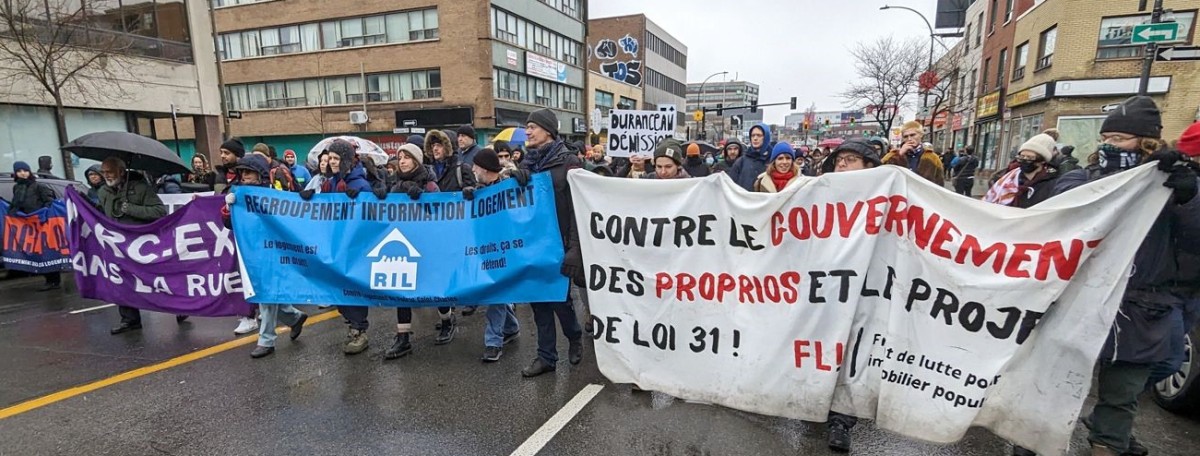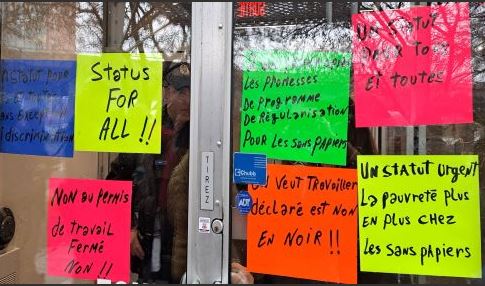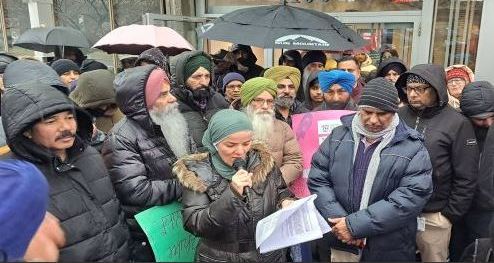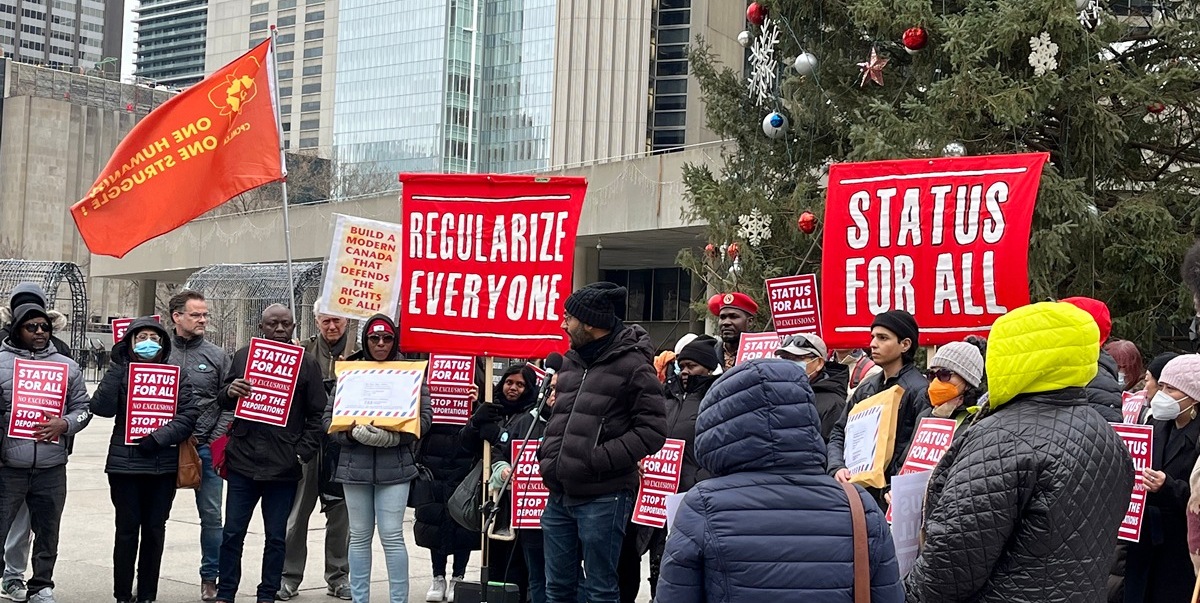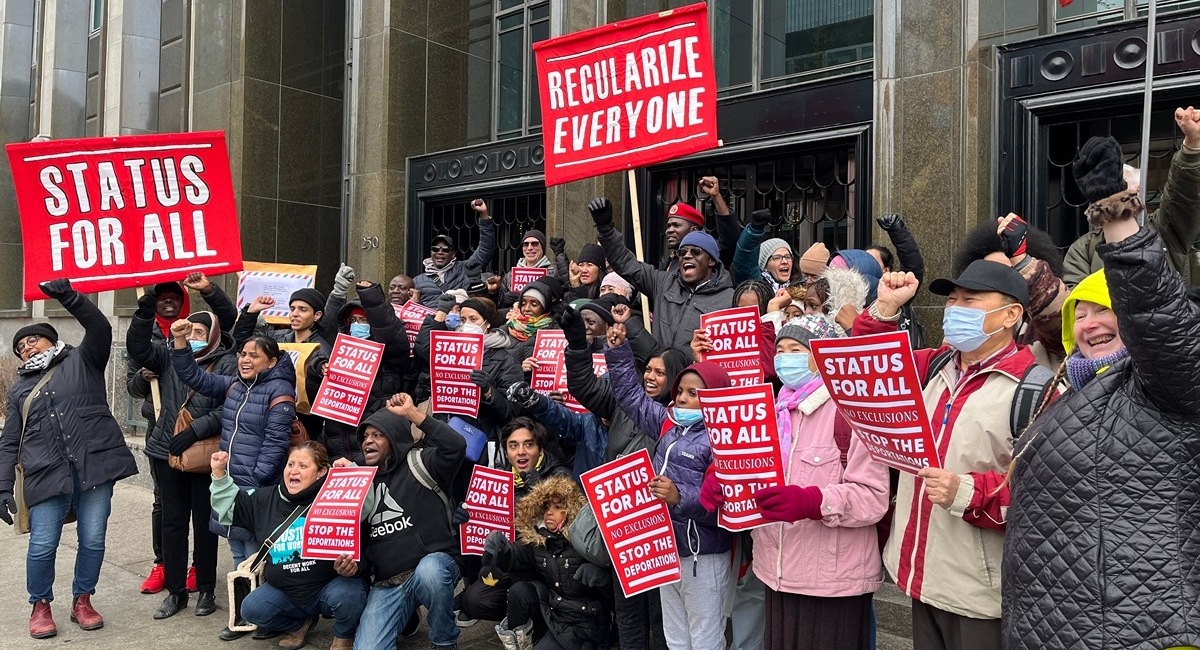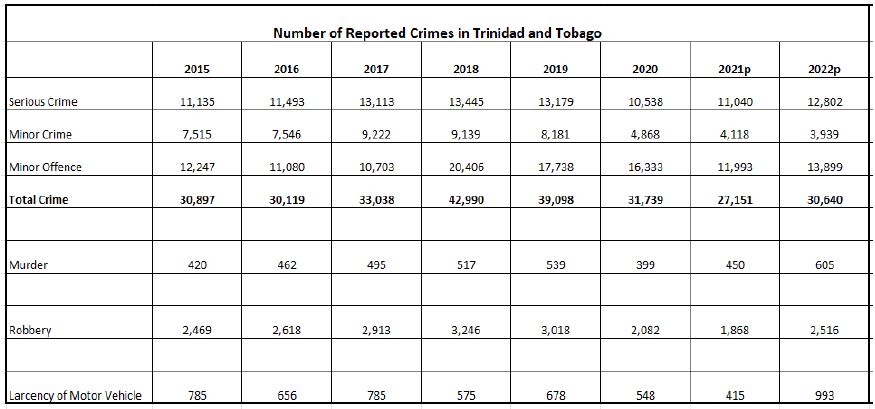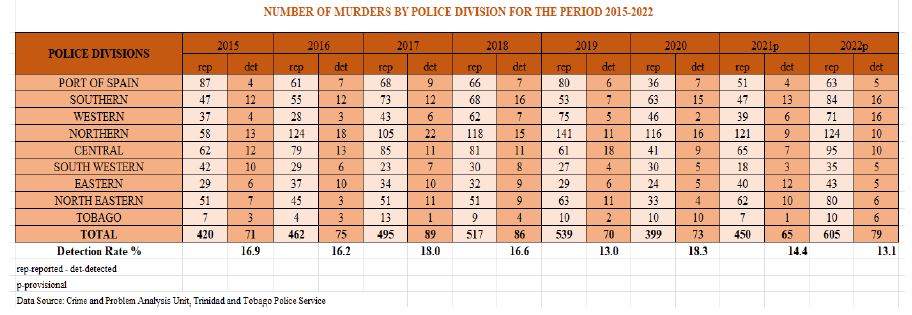No. 12
December 2023
Canada's Economy Contracts
• Time for a New Pro-Social Direction for the Economy!
Alberta's Pension Plan and the Right to Security in Retirement
• Ruling Elite's Denial of Social Responsibility
• Alberta Pension Protection Act Adopted Under Time Allocation
• Factional Fight Over Seizure and Control
of Pension
Funds for Private
Gain
• Letter to Alberta Premier from Congress of Union
Retirees,
Calgary Chapter
• Response of Ruling Elite to Alberta
Pension
Plan Proposal
For Your Information
• Origins of Schemes for Alberta Pension Plan
Support for Quebec Public Sector Workers Continues to Grow
• Legault Government Must Stop Blocking End to Strike
• Public Sector Unions Reiterate that Government Must Assume Its Social Responsibilities
• No End to Gestures of Solidarity With Striking Teachers
• Large Rallies Support Public Schools and Those Who Defend Them
Opposition to Quebec Bill 31 on Housing
• Government's Responsibility Is to
Guarantee the Right
to Housing, Not Trample It
International Migrants Day
• Speak-Out in Montreal for Status for All Now!
• Migrant Workers Speak Out in Toronto
• Situation of Migrants in U.S.
Bonaire
• Steadfast Fight for People's Right to Self-Determination
• Human Rights Violations and Dutch
Atrocities Committed
Against Bonarian Peoples
Venezuela -- Guyana
• Beneath the Surface of Border Dispute
Trinidad and Tobago on Brink
• Assault on Our Right to Safety and Security
Republic of Korea
• Broad Resistance to Anti-Social and Warmongering Policies of Yoon Government
Canada's Economy Contracts
Time for a New Pro-Social Direction
for the
Economy!

Statistics Canada announced that Canada's Gross Domestic Product (GDP) fell 0.3 per cent in the third quarter.[1] The Statcan announcement of an economy going backwards despite population growth is not surprising. After all, that is the "plan," if you can call it a plan.
The ruling elite said publicly they wanted to plunge the country into recession to "tame inflation." They proceeded to hike central bank interest rates aggressively to discourage investment in the economy and let it flounder. Certainly, the list of global and other large companies firing thousands of workers in recent weeks is not good news for working people but to be expected according to the "plan" of the ruling elite.[2] They want workers on the defensive and discouraged from organizing and fighting for higher wages, better working conditions and increased investments in social programs.
With price inflation tamed or not and an economy contracting or not, the working people pay the price with unresolved social problems and growing inequality. In fact, for the ruling elites, they have become disposable which gives rise to a serious feeling of helplessness people have regarding the economy. Working people are the human factor in the economy yet they exercise no control over it. Nor, for that matter, do the rich who have lost control of the huge productive powers the productive forces on a world scale have created. They use their positions of power and privilege to form coalitions and cartels of oligopolies and parties in government to plunder the wealth produced by the workers at home and abroad. Then, what the rich cannot control in this way, they seek to destroy. Individual owners of means of production and financial instruments are obsessed with their own possessions and revel in the collapse or takeover of others considered competitors. They see the economy not as the possession and responsibility of all for the betterment of all but as something to be exploited for the benefit of a few and their particular private interests.
However, the modern economy is a single whole made up of parts that must operate in harmony if downturns and crises are to be avoided. This is certainly not the aim of the ruling elite who squeeze maximum profit out of the economy for their particular private interests. With competing interests in control of decision-making and out to fatten their own pockets and pillage the public purse, it is not surprising that the economy suffers from recurring crises. How can it be otherwise when the socialized economy and its parts are not organized to function in conformity with one another for the common good?
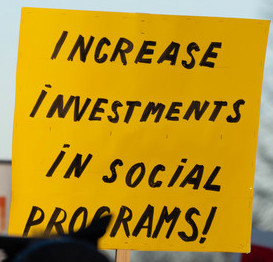 The
government and those in positions of power and privilege declare they
can tame inflation by forcing an economic contraction all the while
insisting governments borrow from private moneylenders to cover debts
from paying the rich and preparing for war. These are principal causes
of price
inflation. They throw people out of work without regard for their
security, privatize public property and starve social programs of
needed investments all with the blind aim of forcing a socialized
economy into serving their narrow competing private interests, even
though that is not its basic nature.
The
government and those in positions of power and privilege declare they
can tame inflation by forcing an economic contraction all the while
insisting governments borrow from private moneylenders to cover debts
from paying the rich and preparing for war. These are principal causes
of price
inflation. They throw people out of work without regard for their
security, privatize public property and starve social programs of
needed investments all with the blind aim of forcing a socialized
economy into serving their narrow competing private interests, even
though that is not its basic nature.
Statcan announcing a contraction in the economy would be funny if not so serious in negatively affecting the people. Statcan describes a situation where the ruling elite in control of decision-making at the level of governance have no intention of finding and applying solutions, which arise from objective considerations to serve the common good and address the whole and root cause of the problems.
The working people are the vastly superior human force and produce all that society and the people require for their existence. The more they make the claims on society for what belongs to them as a matter of right, the more they settle scores with the old conscience of society and the apparatus of the liberal democratic state which no longer functions to sort out contending interests.
The time has come to stop paying the rich, stop paying the debt, end all military purchases from the U.S., make Canada a zone for peace and increase investments in social programs to solve the country's problems and humanize the social and natural environment!
Note
1. The Daily -- Gross domestic product, income and expenditure, third quarter 2023, Statistics Canada, November 30, 2023.
2. Layoffs include BT Group, 55,000; US Group, 35,000; Yellow Transportation, 30,000; Accenture, 19,000; Amazon 18,000; Nokia, 14,000; Vodafone, 11,000; Microsoft, 10,000; Meta, 10,000. Maersk is laying off 10,000 citing a surplus of ships and sharply lower freight rates and its third-quarter profits fell to $521 million down from the pandemic level of $8.88 billion in 2022. Stellantis in November offered buyouts to some 6,400 of its 12,700 employees. The U.S. apparel company Hanesbrands closed one of its plants in El Salvador laying off some 1,592 employees. The French manufacturer of high-speed trains, Alstom, cut 10 per cent of its workforce which was about 1,500 workers. It sold off shares to bolster its balance sheet by 1 billion euros.
Alberta's Pension Plan and the Right to Security in Retirement
Ruling Elite's Denial of Social Responsibility
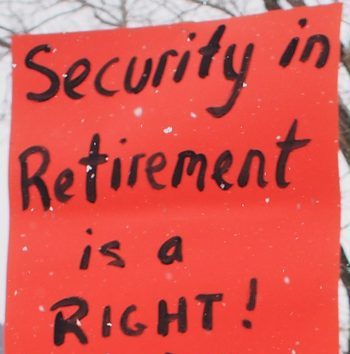 Pensions for
seniors upon retiring from work or for reasons of
incapacity are important features of the arrangement between the
working class and those who own and control the socialized economy.
Pensions for all at Canadian standards of living are both necessary and
possible within the
arrangement with those who buy their capacity to work. Pensions for all
at modern Canadian standards are possible because of the enormous
productive capacity of the working class within the current socialized
economy. The working class recognizes this right and through class
struggle obligates those
who have seized control of the socialized economy to organize a means
of living in retirement for all at the highest level the productive
forces have achieved.
Pensions for
seniors upon retiring from work or for reasons of
incapacity are important features of the arrangement between the
working class and those who own and control the socialized economy.
Pensions for all at Canadian standards of living are both necessary and
possible within the
arrangement with those who buy their capacity to work. Pensions for all
at modern Canadian standards are possible because of the enormous
productive capacity of the working class within the current socialized
economy. The working class recognizes this right and through class
struggle obligates those
who have seized control of the socialized economy to organize a means
of living in retirement for all at the highest level the productive
forces have achieved.
The ruling elite contend that maintenance after the working life is over is individual and not collective in nature. This means that individual workers must save for retirement while working even though they have no say or control over the direction of the socialized economy and the security of their employment, current wages and pension funds. The denial of the collective nature of the modern economy obscures the reality that in retirement workers are no longer producing and must rely on the productive capacity of the active working class for their needs and maintenance. The reality is that the coming generations of workers produce more than enough to maintain those from their collective who are already retired or unable to work for whatever reason. The ruling elite interfere with this arrangement by expropriating much of the new value workers produce to satisfy their aim for ever increasing private profit.
Fraud of Imperialist Pension Schemes
A serious concern of the working class across the country is that ruling elites have turned saving for retirement into fraudulent pay-the-rich schemes. Individual and collective pension funds have been concocted that have become a source of social value for the rich to use to expand their ownership and control of the economy. The imperialist pension funds tax the working class with payments from the individual wages workers receive from selling their capacity to work.
Imperialist pension plans such as Registered Retirement Savings Plans in Canada and 401(k)s in the U.S., and collective company and government pension funds steal the individual wages of workers to pay for what should belong to them by right as a retirement social program underwritten by the productive capacity of the socialized economy and the enormous amount workers produce in the present. The theft of workers' individual wages to fashion pension funds has resulted in the creation of some of the largest sources of social value in the world. The rich use these funds to increase their power and monopoly control of the economy and divide and block the working class from bringing the private relations of production into conformity with the socialized economic base.
The Bank of Canada writes, "The pension fund sector holds about 15 per cent of the total assets of the Canadian financial system, or $1.5 trillion. About two-thirds of pension assets are managed by the eight largest public pension funds in Canada (the Big Eight): the Canada Pension Plan Investment Board (CPPIB), Caisse de dépôt et placement du Québec (CDPQ), the Ontario Teachers' Pension Plan (OTPP), the British Columbia Investment Management Corporation (BCI), the Public Sector Pension Investment Board (PSPIB), the Alberta Investment Management Corporation (AIMCo), OMERS (Ontario Municipal Employees Retirement System) and the Healthcare of Ontario Pension Plan (HOOPP). With net investment assets ranging from $64 billion to $265 billion, the Big Eight are among the world's largest pension funds. All eight were included in a list of the 100 largest pension funds, with three of them ranked among the 20 largest. The Big Eight manage the funds of various defined benefit pension plans: the Canada Pension Plan, the Régime des rentes du Québec, and the plans of public sector employees of the federal and four provincial governments."
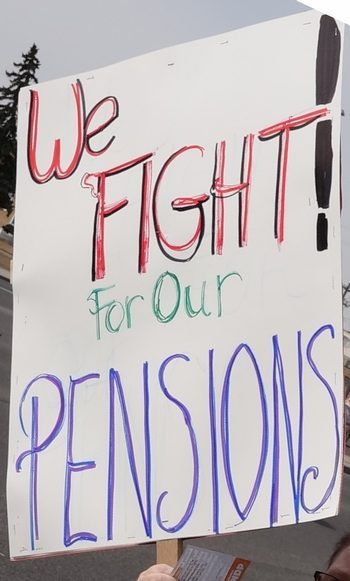
The working class reproduces itself through its socialized work. The social reproduced-value that the working class produces within the economy is more than enough to meet all the individual and social needs of the people such as education, health care and housing for all and retirement at standards the working class determines including for those who have become ill or injured or for whatever reason have not fared well at work.
New value when collected and distributed in a socially responsible manner increases the amount of disposable-time for all and the possibilities to raise the living standards of all humanity at home and abroad to acceptable levels and eliminate crises in the economy. Such a transformation enhances society generally and is a crucial advance in creating the objective conditions to humanize the social and natural environment, bring the relations of production more firmly into conformity with the socialized economic base and to harmonize the relations of individuals with each other and with their collectives and the general interests of society.
Alberta
Pension Protection Act Adopted
Under Time
Allocation
On December 6, the United Conservative Party (UCP) government of Alberta railroaded Bill 2, bizarrely named the Alberta Pension Protection Act, through Third (Final) Reading so that it was passed in the early hours of the morning. Bill 2 states that the government must hold a referendum before Alberta can leave the Canada Pension Plan (CPP) and establish an Alberta Pension Plan. Two amendments put forward by the opposition NDP were voted down. The first amendment called for the referendum to be binding on the government, and the second that the legislation specify that all future contributions to a provincial plan could be used only for that purpose.
Following passage of Bill 2, the legislature was abruptly adjourned ahead of schedule. The use of "time allocation" confirmed once more that legislatures have become quite superfluous in the democratic process which is wielded by private interests through the executive powers. No date has been set for the legislature to reconvene, and the government is not required to present the 2024 schedule until January 15. At the same time, it was announced that the telephone "town halls" set up to promote the Alberta Pension Plan scheme would be paused until the Chief Actuary of Canada provides their estimate of what Alberta might receive if it left the CPP, which is expected no earlier than February.
The fact that a referendum, if held, is not even binding shows that this is merely a PR exercise, and an abysmal one at that. The "consultations" and "engagement" about the UCP's proposal to leave the Canada Pension Plan have only served to underscore that the people have no role in decision-making. There is broad disgust with the use of public funds to disinform the public and push the government's agenda and call it consulting Albertans.
The use of "telephone town halls" is itself a favourite tool of UCP governments. Everyone is invited to call in but how those who get to speak are chosen is decided behind closed doors. In the recent telephone "town halls" about pensions, the moderator even intervened to argue with and abuse speakers who didn't promote the government's agenda. What passes for consultation shows the utter refusal of governments to recognize the necessity for a new direction for the economy based on nation-building and looking after the needs of the people, including security and dignity in retirement.
Drama about "defending Alberta" is used to cover up the reality of the role Alberta has been given in service of the U.S. war machine and economy, at a time when the people of the world are speaking with one voice to Stop the Genocide of the Palestinian People! and against the depravity of U.S. President Joe Biden and U.S. imperialism. How could it be otherwise when the Danielle Smith government is a corrupt government which is quite content to use its positions of power and privilege to declare that whatever it does is legal, legitimate and laudatory.
Factional Fight Over Seizure and Control of
Pension
Funds for Private
Gain

Alberta Federation of
Labour, October 7, 2023
Active and retired workers and their organizations in Alberta have been speaking out and organizing against the attempts of the United Conservative Party (UCP) government to convince the working people of Alberta that they should allow Premier Danielle Smith to, in her own words, get her hands on the "pot of money" of pension contributions from workers who have lived or worked in Alberta. Her claim is that Alberta workers would be more secure in retirement if an Alberta Pension Plan replaced the Canada Pension Plan (CPP).
Getting the workers to side with one or the other is problematic when the federal government itself is using the Canada Pension Fund to further the narrow private interests it serves. Neither gives a hoot about the well-being of retired Canadians who must take up the fight for pensions for all from their own vantage point. Getting caught up in a debate pro or con this or that plan serves to legitimize different ways of administering pensions funds so that the vast amounts of money they contain can be put at the disposal of narrow private interests in the name of the greater good.
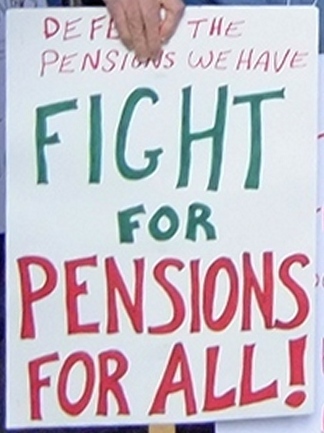
The Alberta Federation of Labour has initiated a petition campaign to say Hands Off Our Pensions! Tens of thousands of individuals and organizations have tried to join the telephone "town halls" to express their views, written letters, and made phone calls to their MLAs to say No! Far from being convinced by the claim that Alberta workers would be more secure in retirement if an Alberta Pension Plan replaced the Canada Pension Plan, workers have responded by saying NO!
The consistent stand of Alberta workers through all the attacks launched by one government after the other, no matter what political party was in power, has been Defend the Pensions We Have! Fight for Pensions for All! Workers consider it the responsibility of all working people to ensure that society looks after its seniors with the respect and humanity they deserve, ensuring their security and a dignified life in retirement.
Phony Consultation Process
The United Conservative Party (UCP) in Alberta is using public funds to carry out a thoroughly fraudulent "consultation process" based on the claim that Alberta could leave the Canada Pension Plan (CPP) taking with it 53 per cent of the Plan's assets. The Canada Pension Plan Investment Board (CPPIB) estimates that if Alberta left the CPP it would be entitled to about 16 per cent of its assets, while economists in Alberta have suggested slightly higher numbers.
The fact that the Alberta government is making claims which are pure fantasy has only confirmed that there is another aim behind the pension proposals.
Further confirming the duplicity of the UCP is its online survey which fails to even ask Albertans whether they want to leave the CPP, but instead asks whether they would like to see lower contributions or larger pensions in an Alberta Pension Plan. Significantly, it also asks participants to rank their answers as to who should manage the fund. It includes "the private sector" -- touted as most trustworthy -- in the "choices." This also raises the question of why LifeWorks, formerly Morneau Shepell -- pension manager and the largest human resources outsourcing company in Canada, which is now owned by Telus Health -- produced such an absurd report which no one can defend. To be generous, one could say that its report is extremely self-serving, as Telus Health is likely at the front of the line of private interests who want control of Alberta pension funds.
The cartel parties, legacy media, and wealthy private interests all present the issue as one of who would provide the highest return on investment. They do not even acknowledge that workers have been fighting for years for a say in how their pensions are managed and where they are invested.
Workers across Canada are taking up the issue of who decides what investments should be made with their pension funds, and that these funds should not be used for investments which harm the working class and people, contribute to wrecking public programs and services, or harm the natural environment. However, this demand for a say and control over what happens to their pension funds, and the demand that society take responsibility for providing security in retirement are not even recognized by the cartel parties, their governments or the legacy media.
Investment managers of the pension funds consider it their "fiduciary duty" to make investments with the aim of achieving maximum capitalist profit, no matter the consequences for working people and for society. This gives rise to investment decisions which are anti-worker and anti-social and harmful to the natural and social environment. Examples of workers actively opposing such decisions of pension boards include the following:
Revera, which has been one of Canada's largest operators of seniors' residences and long-term care homes, is a wholly-owned subsidiary of the Public Sector Pension Investment Board (PSP), a federal Crown corporation charged with investing funds for the pension plans of the federal public service, the Canadian Forces, the Royal Canadian Mounted Police and the Reserve Force.
The PSP has been the owner of Canada's second-largest chain of for-profit long-term care facilities. The Public Service Alliance of Canada (PSAC) and the Professional Institute of the Public Service of Canada (PIPSC) called on the PSP to make Revera a public, not-for-profit company. Instead, the PSP is selling off Revera facilities to private, for-profit operators despite the overwhelming evidence that facilities operating for private profit provide substandard care compared to public and not-for-private profit facilities.
"Revera has made the decision to focus primarily on managing property/real estate and will no longer manage retirement residence operations in Canada," a notice sent to union representatives for Revera workers reads. Management of at least 80 residences is being transferred to private, for-profit companies, adding another layer of private profit at the expense of the seniors who live in these facilities.
The CPPIB and the Alberta Investment Management Corporation collaborated in the privatization of Rio de Janeiro's water system. Formerly a public utility, it was auctioned off by the previous corrupt Bolsonaro regime in Brazil. They even tried to greenwash this decision, and eagerly anticipated the further privatization of water.
This past summer, Ontario teachers actively opposed the union-busting activities of Stone Canyon Industries Holdings Inc. (SCIH) at Windsor Salt in Windsor, Ontario. Ontario Teachers' Pension Plan (OTPP), one of the largest in the world, has major investments in and a seat on the board of SCIH. Presidents of the teachers unions called on their representative on the board to take an unequivocal stand against Stone Canyon's union-busting activities and disrespect for Canadian workers who provide a critical natural resource without which society could not function. The Public Sector Pension Plan Investment Board also has major investments in Stone Canyon. In August 2022, Stone Canyon which subsequently became the new owner of Windsor Salt, shut down its salt mine near Lindbergh, Alberta, laying off 47 workers.
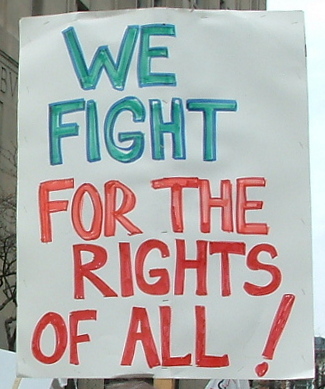 This
is certainly not how the workers of Alberta or Canada want their
pension funds to be used. The fight between narrow private interests
over control of pension funds is not one which safeguards the security
of Canadians in retirement. Pension funds come from the social wealth
that workers
produce, but do not control, just as the workers have no control over
the direction of the economy. Working people themselves must decide
where their pension funds should be invested on a mass democratic
basis. As it stands, the decisions are taken by narrow private
interests and the workers are
told it is none of their business. It is this lack of control by the
workers, who are the producers, over what is produced and how it is
produced and distributed that is at the heart of the problem.
This
is certainly not how the workers of Alberta or Canada want their
pension funds to be used. The fight between narrow private interests
over control of pension funds is not one which safeguards the security
of Canadians in retirement. Pension funds come from the social wealth
that workers
produce, but do not control, just as the workers have no control over
the direction of the economy. Working people themselves must decide
where their pension funds should be invested on a mass democratic
basis. As it stands, the decisions are taken by narrow private
interests and the workers are
told it is none of their business. It is this lack of control by the
workers, who are the producers, over what is produced and how it is
produced and distributed that is at the heart of the problem.
As it stands, the desperation of governments at different levels for investments funds to pay the rich is fueling the fighting between contending factions. How to provide narrow private interests with the infrastructure they require, especially now that the scientific and technical revolution has made much of the technology used in the previous period obsolete, can be sorted out if society puts rights by virtue of being human at the centre of its concerns.
The fight of Canada's working people against their pension funds being used to pay the most wretched private interests on planet earth must be stepped up because the security of Canadians lies not in this or that deal struck between narrow private interests, but in the fight for the rights of all.
Letter to Alberta Premier
from Congress of
Union
Retirees, Calgary Chapter
The following letter to Premier Danielle Smith was sent on December 4 by Peggy Askin, President, Calgary Area Council, Congress of Union Retirees in Canada.
I am writing on behalf of the Calgary Chapter of the Congress of Union Retirees to address some of our concerns with your government's proposal to take Albertans out of the Canada Pension Plan (CPP) and to form an Alberta Pension Plan (APP).
Our
members know well what it means to live on a retirement income, and how
important it is to have security in retirement. As union retirees, many
of us have work pensions in addition to OAS and CPP. As union members
we experienced the ongoing assault on defined benefit pensions and
their
replacement with insecure "defined contribution plans," while many
retirees do not have work pensions at all. Many seniors are struggling
to pay the bills with soaring food prices, rents, utilities and other
necessities; women seniors who live alone are particularly vulnerable
to a life of
poverty.
Our major concern for ourselves and all working people in our province and across the country is that the right to security in retirement, and to the care that seniors require is upheld. Our stand is to defend the pensions we have and to fight for a secure retirement for all. What we urgently need in Alberta and for that matter Canada and Quebec is secure pensions at retirement to ensure a Canadian standard of living.
The actions of your government show that far from having an aim to improve the lives of pensioners, the aim of establishing an APP is part of the battle of competing private interests for control over wealth created by the working people.
To put our retirement security in the hands of an APP created by your government is in our view both unacceptable and to say the least very risky. It also puts the retirement security of our younger generation at risk.
A major concern is who controls decision-making over how pension funds are invested. Through Bill 22, the Reform of Agencies, Boards and Commissions and Government Enterprises Act (2019), the UCP government seized total control over how the pensions funds of 350,000 workers are invested, giving the minister of finance the power to direct specific investments with our pension dollars. This is reason enough to oppose the APP your government is floating.
Bill 22 put the Alberta Teachers Retirement fund under the control of the Alberta Investment Management Corporation (AIMCo), deprived all public sector pension boards of their ability to select a pension administrator, and are now all managed by AIMCo, which means that pension boards will have no say over (how) pension funds are managed. Through these changes a UCP government seized control of $115 billion in pension funds which belong to workers employed by the Alberta government, Alberta Health Services, school boards, municipalities, post secondary colleges, universities and other public sector employees. Bill 22 also deprived many workers of the ability to participate in the pension plans at their workplaces.
It appears that your government is now wanting to exercise control over billions more, providing investment capital to pay the rich, such as privatization schemes and risky investments in oil and gas.
The actions of your government are further proof of why Alberta workers should decisively reject your scheme to form the APP. The government has provided ridiculous estimates of what funds an APP would receive from the CPP. Its "consultation" process has shown utter disrespect for the views of Albertans, including a survey which did not even provide Albertans an opportunity to say No! and telephone town halls where the moderator actively intervenes to oppose those who speak against the proposed withdrawal from the CPP. Many who have attended the telephone "town halls" report that they are more like a session to push the APP and that many with questions and comments are not given an opportunity to speak, and conclude that they are a sham.
The scandalous spending of what is estimated to be close to $7.5 million dollars in public dollars to date on an advertising campaign to promote misinformation about the supposed advantages of an APP is not just unacceptable, it is a clear abuse of power.
It is extremely unlikely that your government will succeed in taking Alberta out of the CPP, given that the proposal benefits only those who want to get their hands on the pension funds, is broadly opposed by Albertans, and will be also opposed by whatever party forms the federal government, not to mention the rest of Canada.
This begs the question of whether the government considers it a way to divert attention from your refusal to meet the needs of the people of Alberta, including the crisis in health care and seniors care, education, affordable housing, homelessness, and the soaring costs of food, electricity, rents and other necessities.
In conclusion our stand is that the proposal for an APP be withdrawn! We defend the pensions we have and fight for retirement security for all.
Response of Ruling Elite
to
Alberta Pension Plan Proposal
After Alberta Premiere Danielle Smith announced that the United Conservative Party (UCP) government would pursue the establishment of an Alberta Pension Plan to replace the Canada Pension Plan (CPP) for workers who live or work in Alberta, she appointed Jim Dinning as Chair of the Alberta Pension Plan Engagement Panel.
Dinning appeared to be a credible representative of the corporate elite in Alberta. Dinning served as Provincial Treasurer from 1992-1997, among other cabinet positions, presiding over the anti-social, anti-worker assault launched by the Ralph Klein government. He left politics after his unsuccessful bid to replace Klein as leader of the Alberta Progressive Conservatives. He has a history of directorships, including a string of appointments as Chair of the Board, as long as your arm, is a former Chancellor of the University of Calgary, member of the Order of Canada, and one-time Chair of the Calgary Health Region. But it appears that he has been unsuccessful in providing a corporate stamp of approval.
Federal Conservative leader Pierre Polievre told the National Post that "The division today on the CPP is entirely the result of Justin Trudeau attacking the Alberta economy. His unconstitutional anti-development laws and painful carbon taxes have forced Albertans to look for ways to get some of their money back."
"We would not be having this CPP debate if I were today prime minister because Alberta would be free from carbon taxes, unconstitutional anti-energy laws, and other unfair wealth transfers."
"I encourage Albertans to stay in the CPP."
Calgary Chamber of Commerce CEO Deborah Yedlin issued a statement expressing serious reservations about an Alberta Pension Plan. "The Alberta Pension Plan proposal is complex and has far-reaching implications for businesses and investors -- in Alberta and across Canada. Dismantling existing systems and altering our pension system could compromise labour mobility from other provinces, the benefits of risk pooling that comes with a larger pension fund, and investor confidence. We urge the government to strongly consider -- and prioritize -- stability across all public policy decisions."
Calgary Herald columnist Chris Varcoe, who faithfully represents the interests of the Alberta energy oligarchs, reported that "a new poll of business operators conducted by the Alberta Chambers of Commerce found a majority believe withdrawing from the Canada Pension Plan and establishing a provincial program would disadvantage their companies over the next three to five years."
"The UCP are always happy to annoy and challenge Liberal Ottawa. Such fun. But now they're going too far, making Alberta look like a threat to the whole country," another Calgary Herald columnist, Don Braid said.
The Business Council of Canada also expressed its dismay. Its CEO Goldy Hyder said, "You have to be careful what you wish for. It could unravel the whole thing and a lot of Canadians could be exposed quite dramatically in their pensions," the Calgary Herald reported.
Mount Royal University political science professor Lori Williams reported there are grumblings among federal Conservatives that Alberta's claim to 53 per cent of the CPP could be alienating Canadians and "help Liberal Prime Minister Justin Trudeau's currently-beleaguered electoral fortunes."
For Your Information
Origins of Schemes for Alberta Pension Plan
The proposal to have Alberta withdraw from the Canada Pension Plan dates back to 2001, when on Stephen Harper's initiative, Harper and five members of the "Calgary School" published an "An open letter to Ralph Klein." The letter declared that in the 2000 federal election, the Chrétien Liberals, who had come out on top, winning 172 of 301 seats in the House of Commons, had conducted "a series of attacks not merely designed to defeat its partisan opponents, but to marginalize Alberta and Albertans within Canada's political system."[1]
"It is imperative to take the initiative, to build firewalls around Alberta, to limit the extent to which an aggressive and hostile federal government can encroach upon legitimate provincial jurisdiction," the letter to Klein stated. The letter became known as the Firewall Letter.[2]
The Firewall Letter called for a provincial pension plan, a provincial police force to replace the RCMP, collecting its own provincial income tax, Senate "reform" modelled on the U.S. Senate with elected Senators and all provinces and Quebec having the same number of Senators, and removing all federal control over health care. It also demanded that the Klein government demand changes to the equalization formula. Klein was focused on restructuring of the state, carrying out a then unprecedented slashing of health care, education and social programs together with large-scale privatization of publicly owned enterprises and delivery of public services in massive pay-the-rich schemes. The government did not take up the proposals in the Firewall Letter.
Harper set his sights on control of the federal political power. The Harper government in power did change the equalization formula in 2009. This did not stop Jason Kenney, a leading member of Harper's government, from claiming the new formula was unfair to Alberta, and engaging in Quebec bashing, and even holding a referendum on the matter when he became Premier of Alberta.
The proposals contained in the Firewall Letter disappeared during the years in which the Harper Conservatives were in power, re-emerged briefly in the 2012 provincial election when Danielle Smith was leader of the Wildrose Party, and then disappeared again until the election of Jason Kenney's United Conservative party (UCP). Kenney established a "Fair Deal Panel" in 2019 which issued a report in 2020 reviving various proposals from the Firewall Letter including exploration of an Alberta Pension plan and an Alberta police force to replace the RCMP.
Only with the election of Danielle Smith has the idea of an Alberta Pension Plan moved beyond a talking point in the battle for regulatory control of energy and other projects and acquiring and controlling funds for infrastructure investments. But Smith is facing opposition from the private interests she is tasked to serve. One reason is that her scheme is out of sync with the fight to control the federal political power. Since the Firewall Letter in 2012, establishing an Alberta Pension Plan and other such proposals have been part of the depiction of Liberal federal governments as hostile to Alberta. But leaving the CPP is a years-long project, and going forward with it would pit Harper's man Poilievre, whether in power or in opposition, against a UCP government in Alberta. Time to stand down, you've had your fun, the message to Danielle Smith seems to be.
Notes
1. The Calgary School was a group of neo-liberal academics from the University of Calgary's political science, economics, and history departments where Stephen Harper attended university. Their role both in academia and behind the scenes in the cartel party system that keeps Canadians out of power shows the extent of U.S. imperialist dictate over Canadian political affairs.
An article in TML Daily, April 8, 2013, pointed out, "From its beginnings in the 1960s, the Political Science Department at the University of Calgary was dominated by a U.S. fifth column. The first chair of the Political Science Department was C. Burke Inlow, an American who was recruited directly from the Pentagon, where he had been involved in 'intelligence work' with U.S. personnel stationed in Iran and the Middle East."
Neo-liberals were recruited from the U.S. and even the Vatican, as well as graduates from Canadian elite private schools, who provided an ideological foundation and active political organizing for the Reform Party, which later took over the Progressive Conservative Party, while the U.S. oil companies provided the money. Together they played a significant role in bringing Harper to power and furthering the integration of Alberta and Canada into the U.S. war economy and machine.
"Members of the Calgary School are associated with the U.S. political scientist Leo Strauss whose most famous adherent was Paul Wolfowitz, considered the main architect of Bush's Iraq war strategy. Strauss claimed a philosophical justification for monopoly right on the basis that domination and subjugation are the 'natural order' of the world. The elite who rule by virtue of their superiority necessarily must be above the law, and use 'noble lies' to accomplish their aims because the people cannot be trusted with the truth."
Others claimed to be followers of Friedrich Hayek, who denied that such a thing as a society exists and argued that it bears no responsibility towards any of its members except the most powerful. Margaret Thatcher and Ronald Reagan claimed to be followers or strongly influenced by Hayek. Danielle Smith was mentored by Tom Flanagan, one of the U.S.-born members of the Calgary School, who acted as a political advisor to Harper and later to Danielle Smith herself. A virulent opponent of the rights of the Indigenous Peoples, Flanagan made a career of providing both ideological and legal opinions aimed at depriving the Indigenous Nations and Métis of what belongs to them by right. This continued until his "last stand" when the Indigenous youth and people of Lethbridge thoroughly exposed him and brought his career to a screeching halt.
2. The Firewall Letter can be found here.
Support for Quebec Public Sector Workers
Legault Government Must Stop Blocking
End to Strike
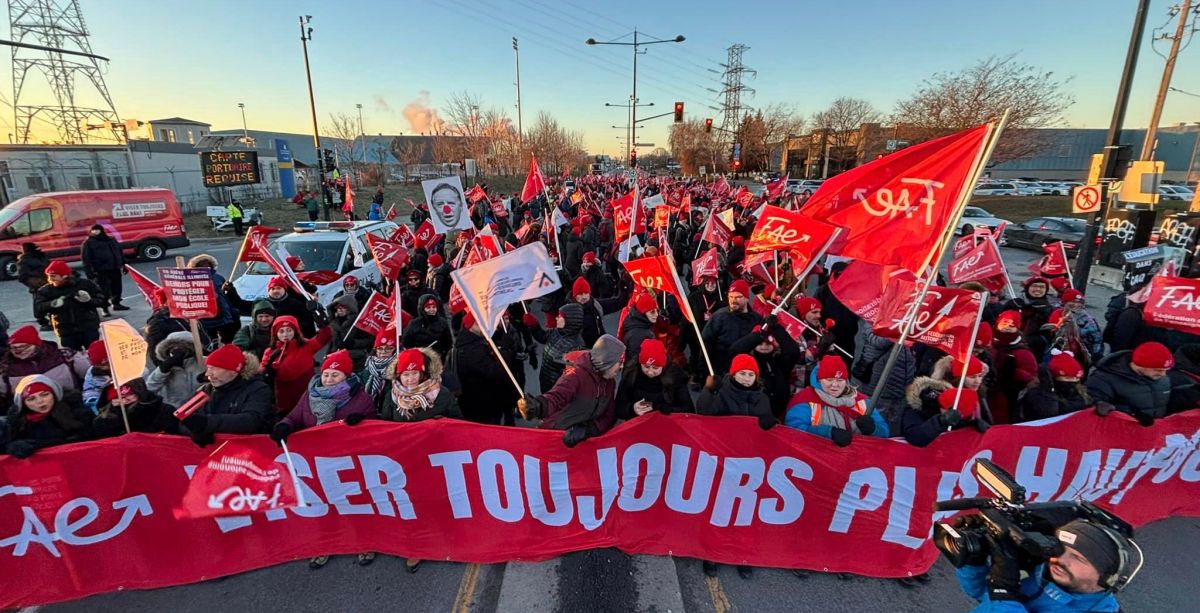
Teachers block entrance to Port of Montreal, December 21, 2023.
December 22 marked the 22nd day of an unlimited general strike by the 66,500 teachers of the Autonomous Teachers' Federation (FAE). Students in 12 school districts in the Montreal, Quebec City, Montérégie, Eastern Townships, Laurentians and Outaouais regions – nearly 40 per cent of Quebec schools -- have been out of school since November 23. The FAE leadership regularly informs its members and the public of the obstacles the Legault government is putting in the way of ending the strike.
On December 21, FAE President Mélanie Hubert said that, despite some 20 days on strike, the government is still not in negotiating mode. The FAE negotiating team had learned through the media that an offer would be tabled later that day. This latest offer was rejected. The employer presented again demands that have already been rejected, and there were major differences between what the government representatives said and what was on paper when the offer was tabled. What's more, one of the teachers' most important demands is class composition. The government refuses to commit to mechanisms that would ensure the opening of new classes to meet students' needs.
The FAE President clarified:
"After more than 90 meetings in 11 months of talks, the 20-day count-down to the indefinite general strike and the 20 days since it was called, there is no longer any doubt in our minds that François Legault's government has no intention whatsoever of helping public schools recover from the deterioration they have suffered over the past 20 years. The employer's proposal for an agreement has little to do with the union's oft-repeated proposals. The Premier and his representatives have opted for a strategy to exhaust teachers by allowing this conflict to drag on, which is completely unacceptable and irresponsible considering teachers' suffering and the impact on students from the lack of quality services."
In fact, the government is continuing its drive to circumvent those elements of the employment contract that restrict it from doing whatever it likes to set the composition of a teacher's workload. At the heart of the battle is the increased power in the hands of the Education Minister. Bill 23, passed on December 7, is another school governance reform that blames teachers for the crisis in the school system by imposing training for expected government-defined competencies, rather than starting from the direct experience of education workers.[1]
It is to the teachers' credit that they refuse to return to teaching without new working conditions that will have a direct effect on the quality of students' study and learning conditions. The Legault government bears full responsibility for the insecurity and anxiety experienced by teachers and families since November 23.
Speaking to the media on December 23, the FAE President said that discussions with management had intensified since Friday: "We're working hard, but there are still discussions to be had, subjects to be negotiated, so I'm going to reserve judgment. [...] We've always had the objective of reaching an agreement before the holidays, but we won't sign an agreement on the cheap."
Note
1. "Centralization of Powers in the Hands of the Minister Under Pretext of Efficiency," Workers' Forum, September 22, 2023.
(Quotations translated from original French by TML.)
Public Sector Unions Reiterate that Government Must Assume Its Social Responsibilities
On December 20, spokespersons for the unions united in the Common Front announced the possibility of going on an unlimited general strike at the beginning of 2024, if the government does not demonstrate by then a political will to respond to the priorities set by workers. They said, "Given the current state of the networks, this is no time for the status quo, and even less for attacks. The sectoral tables must be given mandates to respond to the union proposals, starting today, in order to reach a global settlement. The ball is now in the government's court. Our members are mobilized and determined. We have a clear mandate to resort to unlimited general strike action to obtain the working conditions needed to put an end to the labour shortage. We will exercise this mandate if and when necessary early in the new year. What we want now, first and foremost, is to negotiate seriously." According to media reports on December 23, the government was in intensive negotiations with the Common Front.
The unions in the Common Front, representing 420,000 health care, education and social services workers, are the Confederation of National Trade Unions (CSN), the Quebec Union Central (CSQ), the Quebec Federation of Labour (FTQ), and the Alliance of Health Care Professionals and Social Service Personnel (APTS).
The Federation of Education Unions (FSE-CSQ), which represents nearly 87,000 teachers, received a proposal for a sectoral (task-related) regulation on December 22, and agreed to present it to its members. President Josée Scalabrini commented: "Our mandate was to make concrete improvements to teachers' daily lives, based on our three priorities of class composition, workload reduction and remuneration. We were able to agree on a proposed settlement because we are making progress on these three elements." Teachers will be asked to vote on the agreement in the weeks following their return to the classroom after the holiday break. She added: "We must remember, however, that the problem remains unresolved with regard to the issues at the central intersectoral table. In particular, wage issues will have to be resolved to avoid an unlimited Common Front general strike in early 2024."
The Interprofessional Health Care Federation of Quebec (FIQ), which represents 80,000 health care workers, announced on December 19 that it had requested the intervention of a conciliator. "After over 75 negotiation meetings and more than a year at the bargaining table," said FIQ President Julie Bouchard, "there are still very significant differences between us and the government. Regarding fundamental issues like overtime management, ratios and compensation for inconvenient shifts, we are still light years apart. In this context, we think that appointing a conciliator could help us move toward an agreement. The government is sticking to its guns and refuses to compromise. The government's proposals do not correspond to health care professionals' needs [in any way] whatsoever, especially with regard to their need for work stability and predictability. Health care professionals are fighting for their working conditions and the public's care conditions."
On the issue of Bill 15, passed under a gag order on December 9, the FIQ said that it is "collaborating with over a hundred organizations to denounce this excessive reform, which promises to be catastrophic for the health care network. Thousands of people have asked Minister Dubé to put his reform on hold in order to assess its consequences. Nevertheless, true to form, the government has chosen to act precipitately and has passed its bill under a gag order, in an undemocratic and reckless manner."[1]
"It's already clear that 2024 won't be an easy year. However, we will remain mobilized to defend the rights of care professionals and we will continue to support a strong public health network, to which Quebeckers aspire," she added.
Note
1. Adopted under gag order on December 9, Quebec Health Minister Christian Dubé's Bill 15, the Law to make the health and social services system more efficient, concentrates all powers in the minister's hands by creating the Quebec Health agency which becomes the only employer in the health care and social services network in Quebec. It is said that the minister knows that he must "bulldoze" the collective agreements if he wants to succeed in his anti-social reform.
No End to Gestures of Solidarity
With Striking Teachers
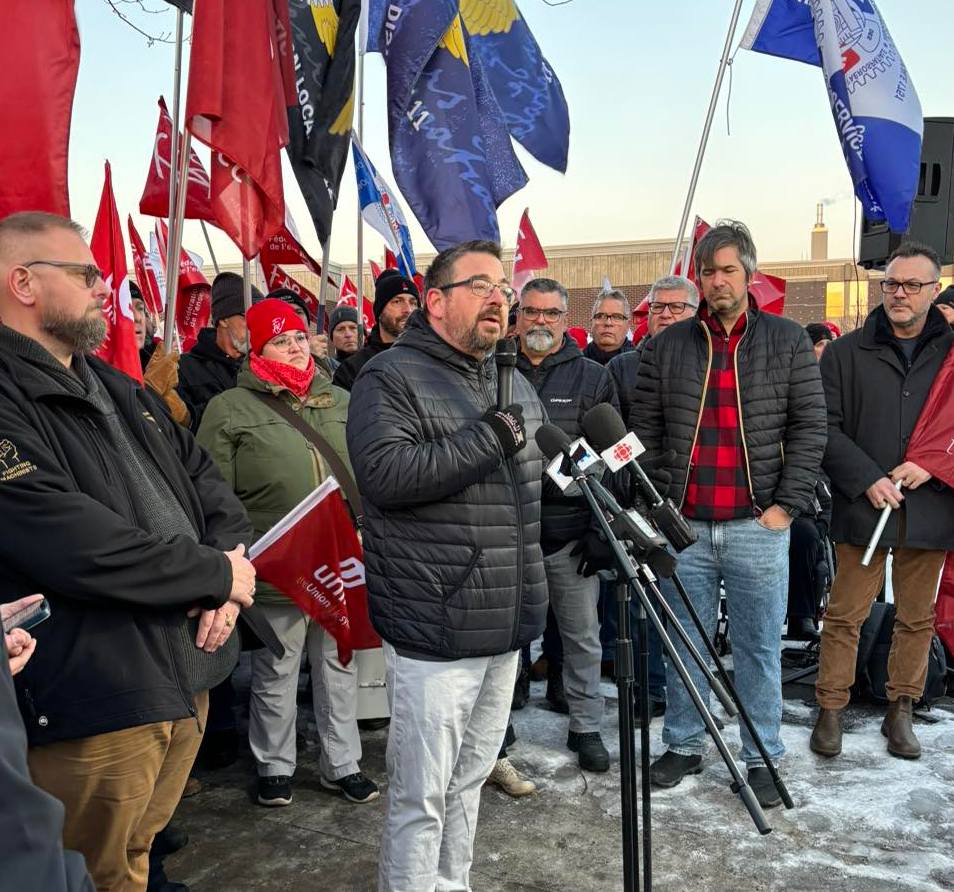

Teachers receive financial support from Unifor (left) and the International Association of Machinists and Aerospace Workers
Following the donation by United Steelworkers of $100,000 to striking public sector workers, Unifor and the Public Service Alliance of Canada (PSAC) also made donations on December 15 of $70,000 and $100,000, respectively.
"Unifor is proud to provide financial support to the strikers because our struggles are intertwined, and it is through solidarity that private and public sector workers can win, together," said Lana Payne, Unifor's National President.
"These public servants are the backbone of our society, educating our children and caring for the entire population. They deserve our sympathy and respect," said Yvon Barrière, Executive Vice-President of PSAC-Québec.
The Federation of Private Education Personnel (FPEP-CSQ) donated $80,000 to the Quebec Union Central (CSQ), with which it is affiliated. "Our contribution is a message of solidarity and support for our colleagues' fight to halt the deterioration of working conditions in the education sector," said Stéphane Lapointe, president of the FPEP-CSQ, in a press release.
The Facebook site, Entraide pour les profs en grève (Mutual Aid for Teachers on Strike) [[www.facebook.com/groups/744988570776994/]], set up at the beginning of December, publicizes initiatives taken by or for teachers to provide food, gift cards, free restaurant meals, discounts at various retailers, etc. There are too the hundreds and hundreds of people who have visited the teachers' picket lines to offer their support in the form of coffee and meals.
Below are photos from various actions organized by and for teachers over the recent period.
Greater Montreal Area
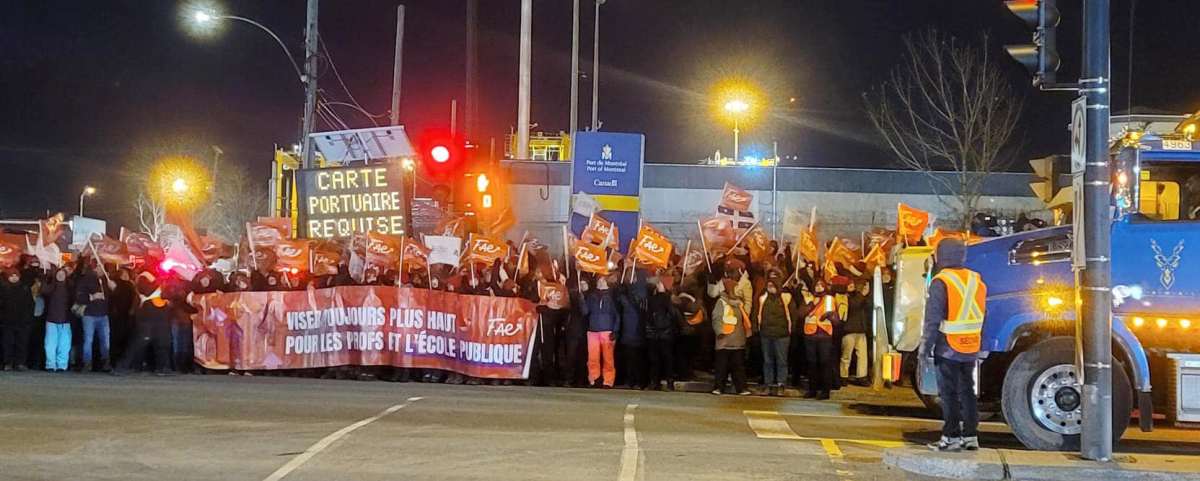
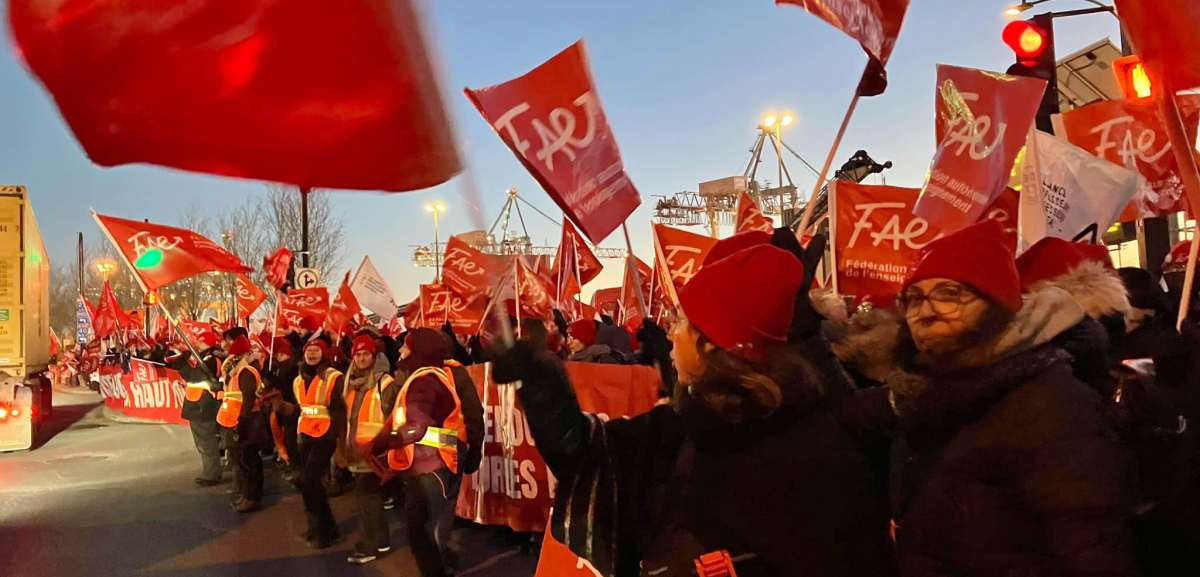
Teachers block entrance
to Port of Montreal, December 21, 2023
Granby
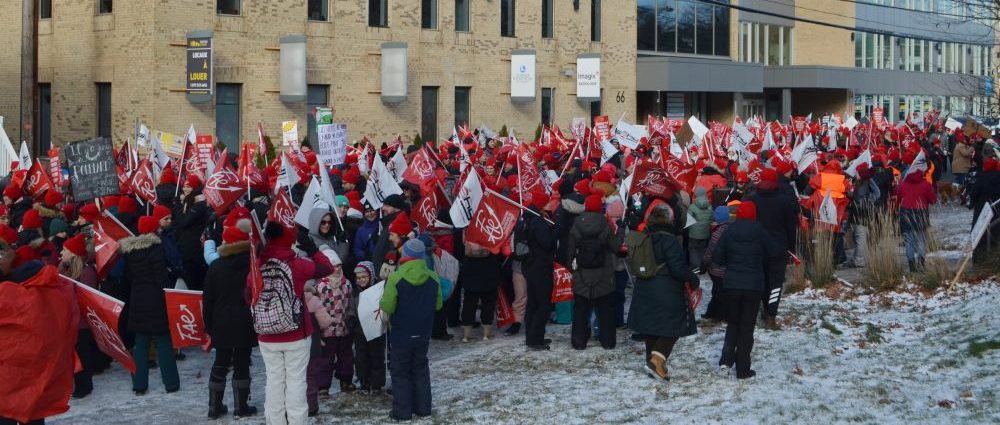
December 20, 2023
Quebec City
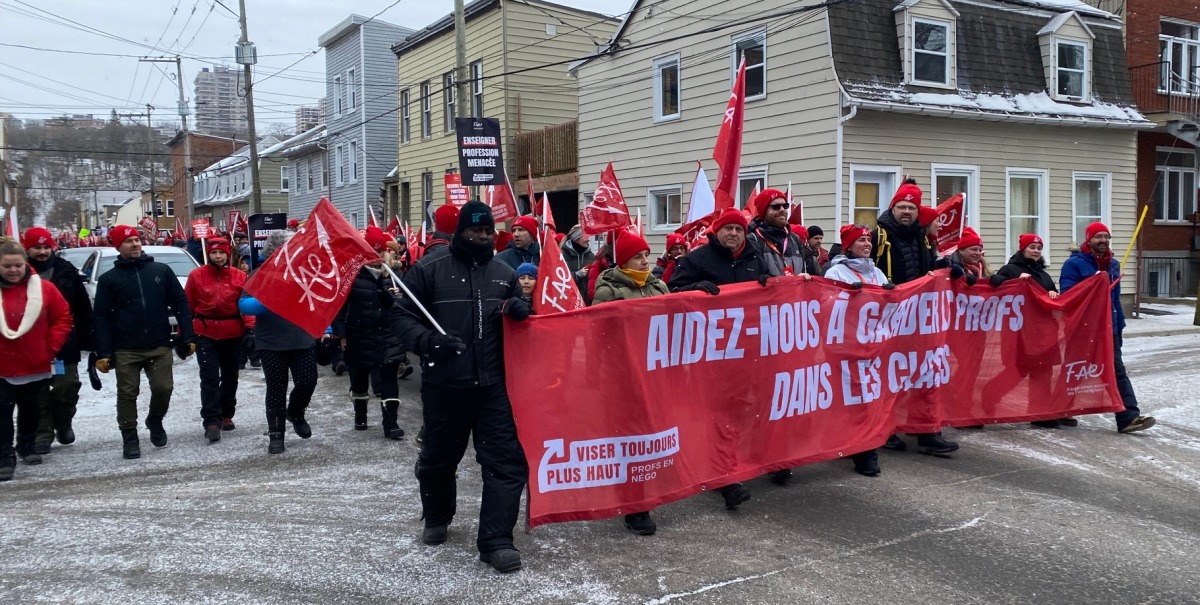
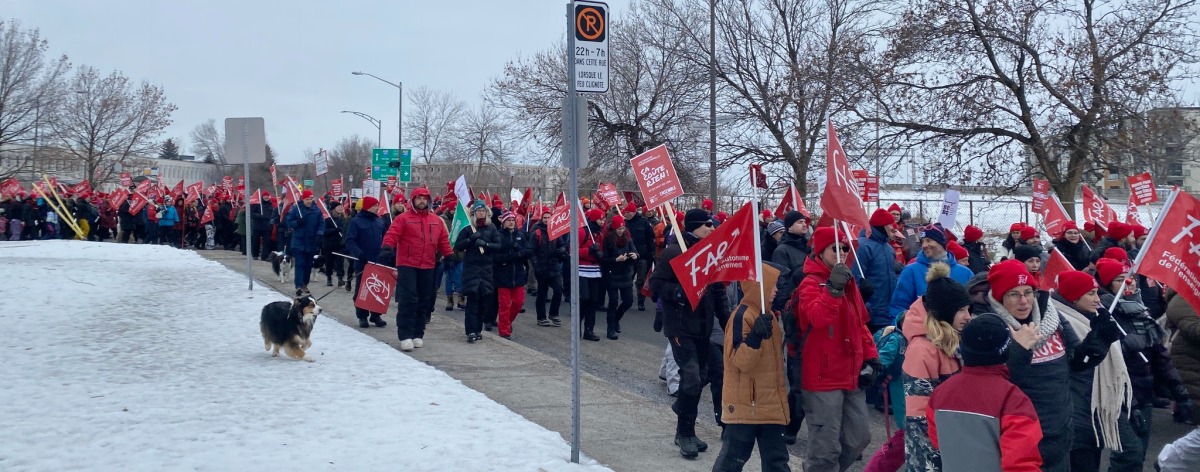
December 14, 2023
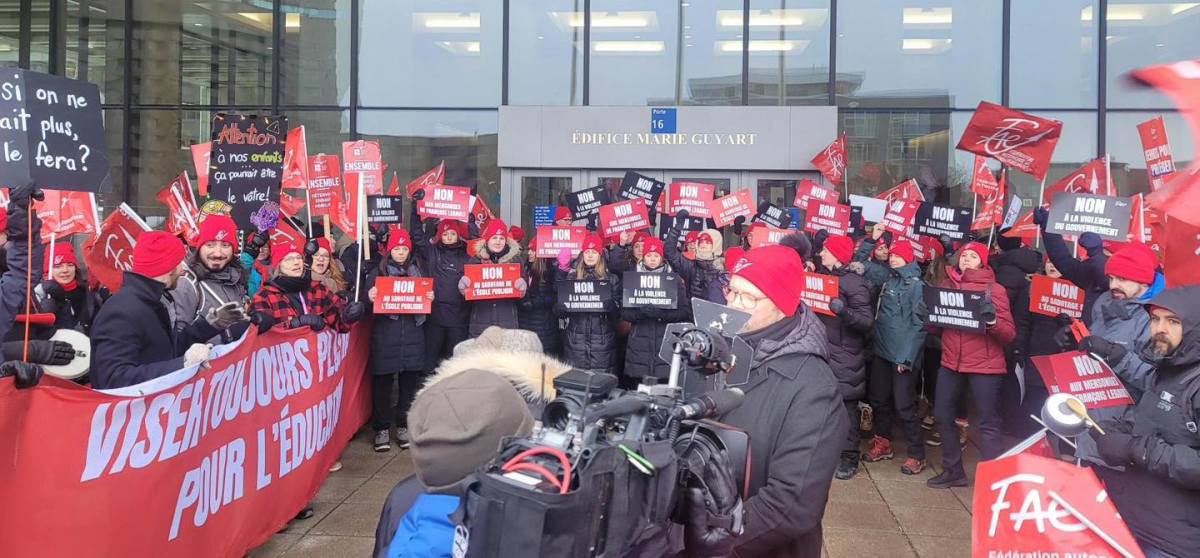
 December 15, 2023
December 15, 2023
Outaouais
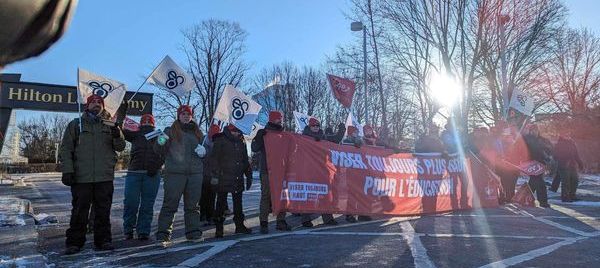
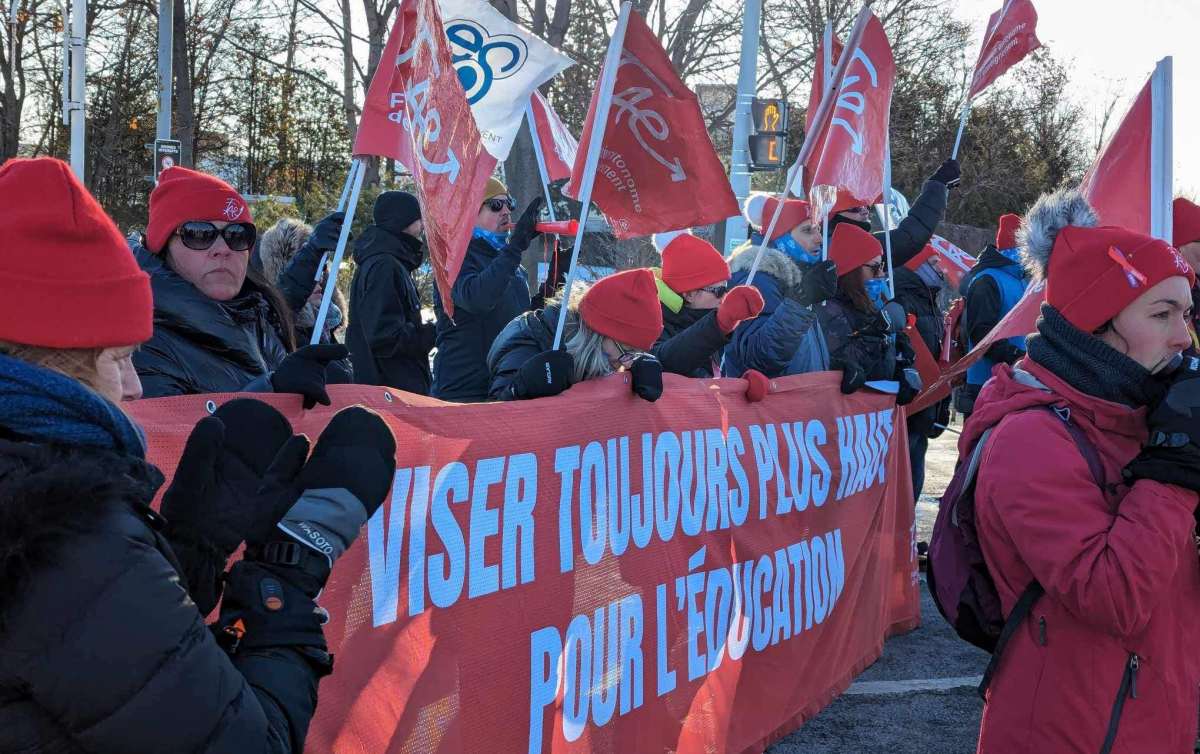 December 21,
2023
December 21,
2023
(Photos: FAE et ses syndicats affiliés, Granby-Express. Quotations translated from original French by TML.)
Large Rallies Support
Public Schools and
Those Who Defend Them
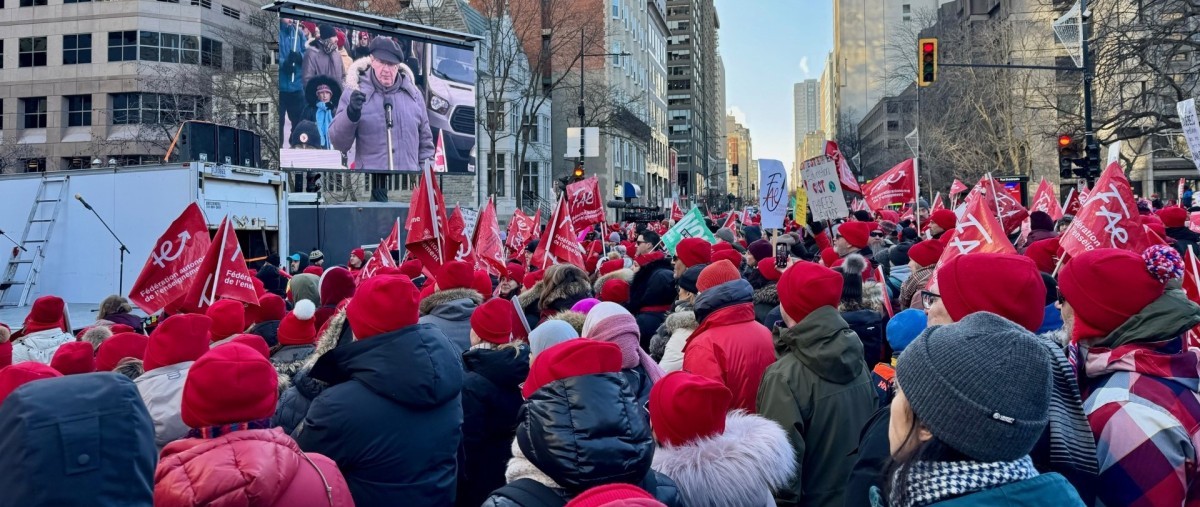
Montreal rally, December
22, 2023.
On December 22, a rally in support of public schools and the teachers who defend them was held in front of Premier François Legault's office in Montreal. Hundreds and hundreds of people turned out to salute the struggle of teachers, particularly those from the Autonomous Teachers' Federation (FAE), who have been on strike for 22 days. Speakers – mostly beloved Quebec artists – along with rights activists, union representatives and teachers, expressed in turn their social solidarity with striking teachers and all public sector workers.
Emerging from the speeches was a deep consciousness that it is Quebec teachers and their colleagues in educational institutions who are defending a national project for public education, where the conditions of those who work in public education enable young people to flourish and acquire the knowledge they need to help build a modern Quebec. Many challenged the Legault government, exposing how its refusal to respond to teachers' demands makes it an enemy of public services that meet the needs of the people of Quebec.
These are a few extracts from the speeches:
- "A teacher raises a human being! That elevates society! A teacher raises Quebec! It's high time the Legault government stepped up its proposals and its discourse!"
- "We know that this struggle begins with you. You are the ones who fight day after day so that your students confidently overcome obstacles, so that they discover their talents and come to understand the world around them. And it's because you haven't been given the means to accomplish this work, this mission, that you're on strike. It's in the name of public schools that you've taken to the streets. It's time this government gave you the means to do your job, so that it can continue to have meaning."
- "You should be celebrated; you should be admired. Instead you're trying to make your voice heard. [...] You create wealth in Quebec. It's time to stop seeing education as a cost to get out of the excel picture. Mr. Legault must treat it as the real investment."
- "[W]omen will stand up to take care of the society you are neglecting and dismantling. To all those on the streets, out in the cold, never forget your value even when your government offers you crumbs. Never forget where you come from. If we drop all this, it's not the public service we're dropping. We're not bringing unions to heel. We're abandoning a society. And no one — not a single Quebecer -- deserves that."
- "A functioning education and health care system is only possible when what real work means is valued, when the dialogue and humanism required to do it and accomplish it are given space. The government is trying to exhaust you, to divide you, but it has forgotten that you are on strike to fight this exhaustion. Against this broken and sick system of management, it is you who are there."
At the end of the rally, all speakers pledged to continue their actions of support in January. They affirmed that they will not leave teachers alone in this battle because it concerns the whole of Quebec.
A similar rally was held in Quebec City in front of the National Assembly. Many families joined the teachers to show their support. One mother, as quoted by the Journal de Québec, said, "The determination of the teachers touches me. There's something broken in our education system. It needs attention and we feel that the Quebec government doesn't understand it." Several students also took part in the action. "I'm here to help the teachers convince the government [to do better]. There are students in my class who are struggling, and my teacher, whom I adore, needs more support. She needs eight arms to help everyone," said one girl.
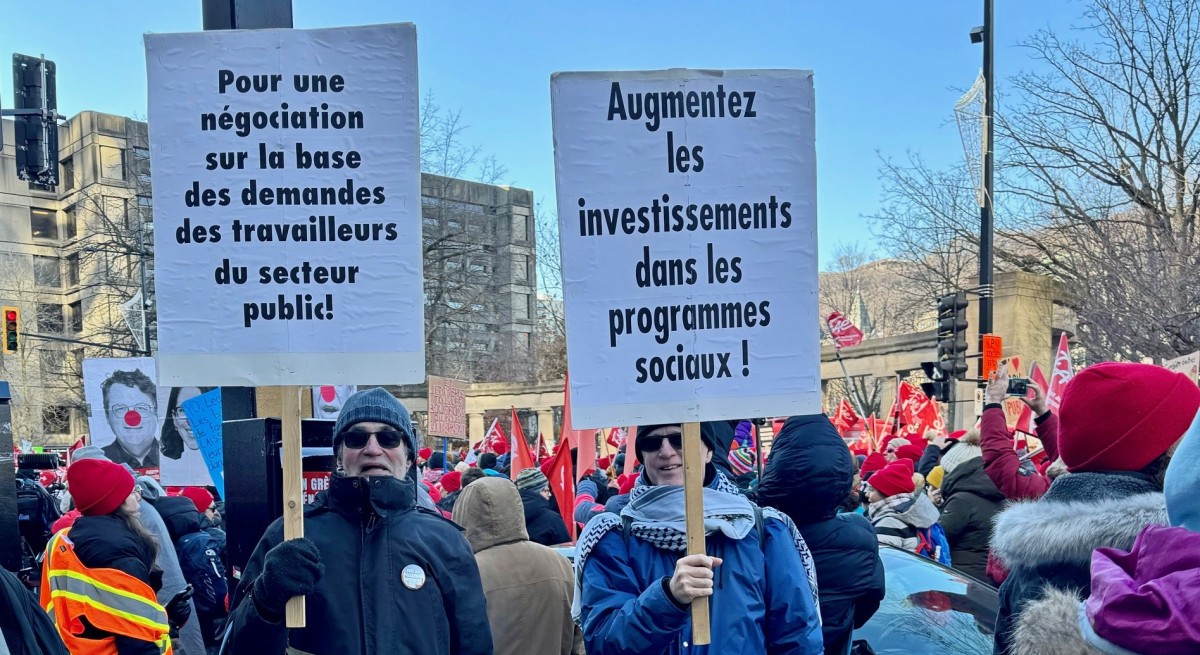

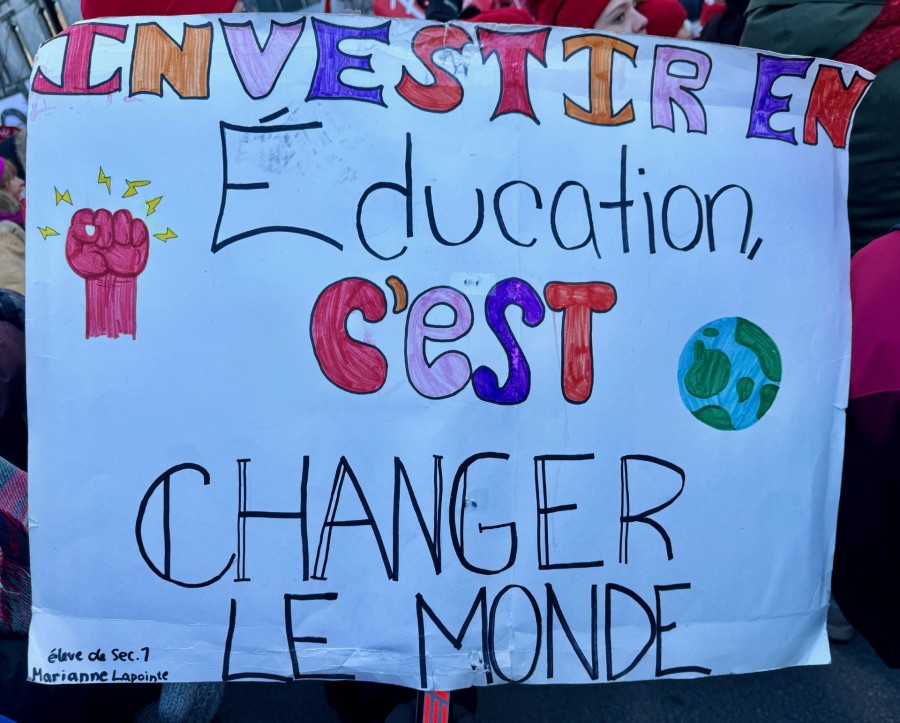
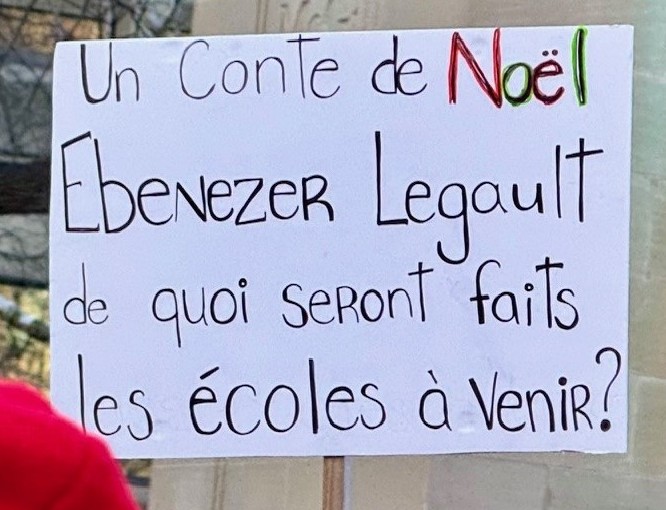
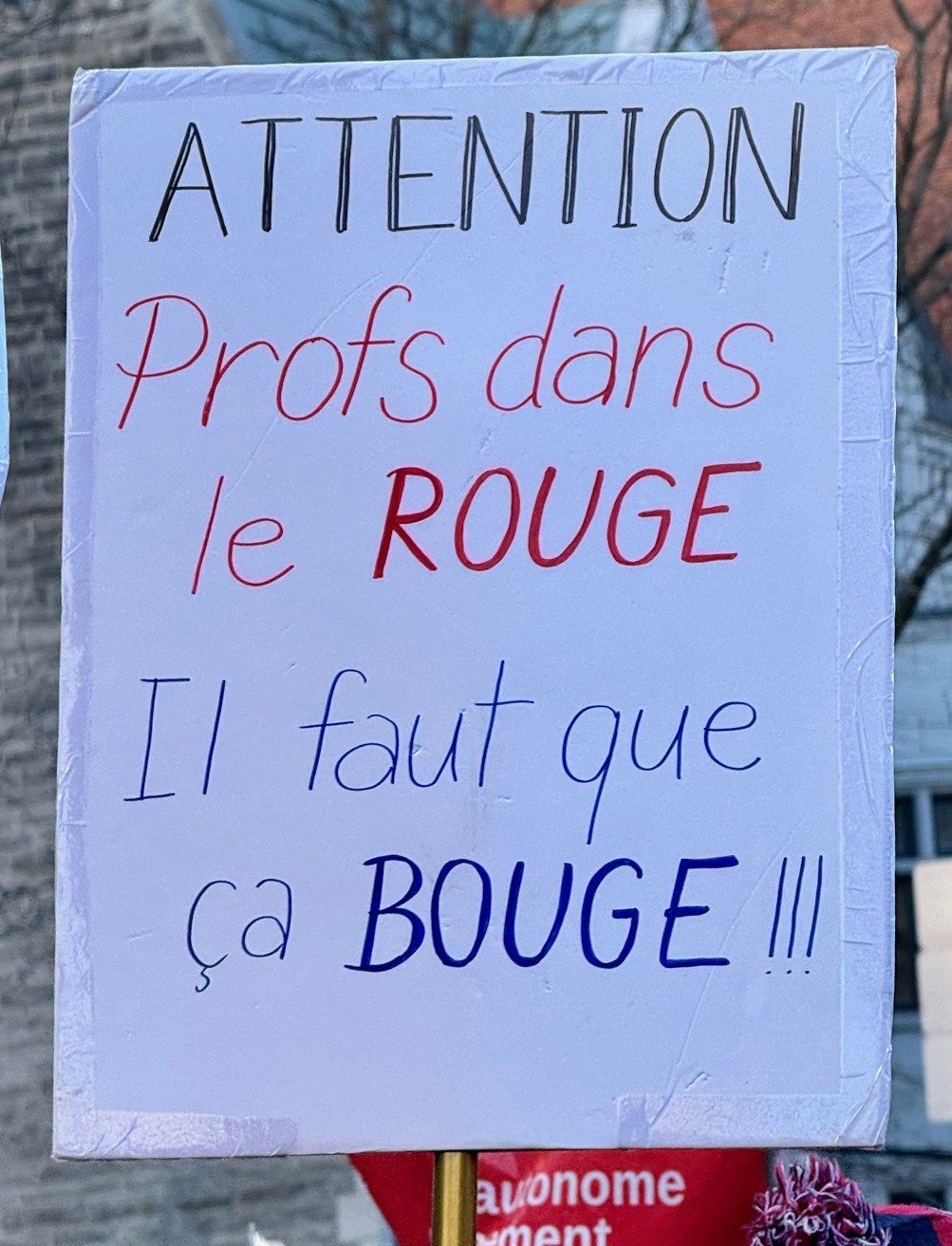
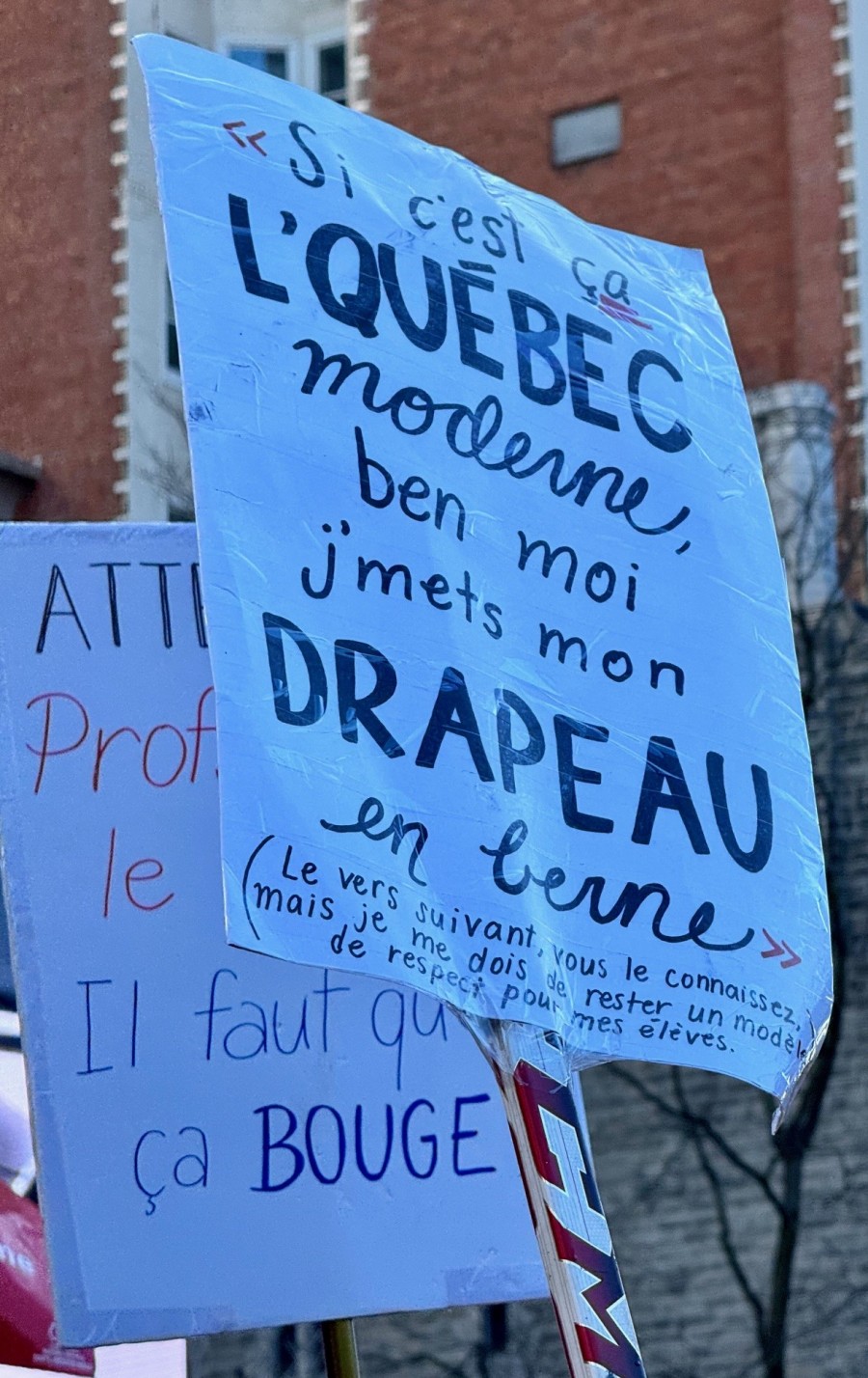
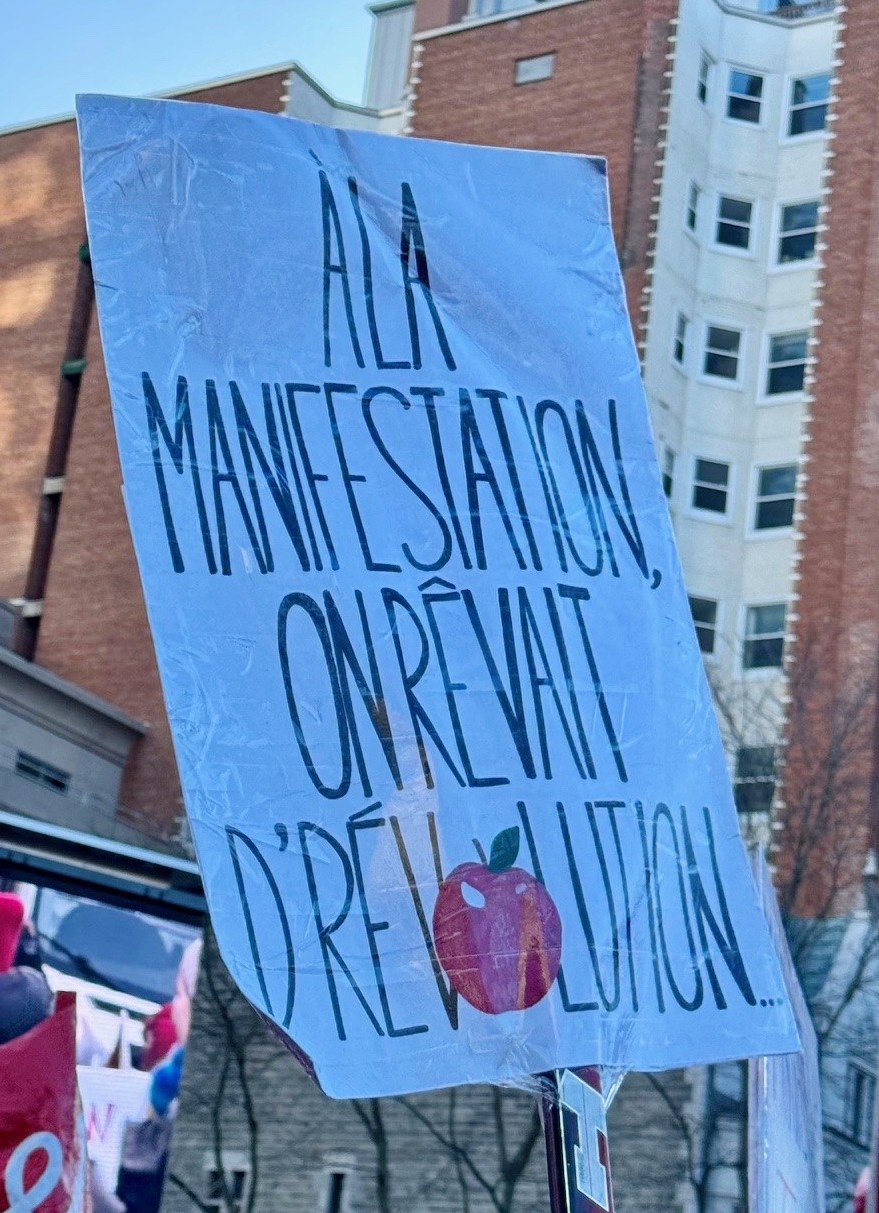
Opposition to Quebec Bill 31 on Housing
Government's Responsibility Is to Guarantee the Right to Housing, Not Trample It
On December 2, hundreds of people marched through the streets of Montreal opposing the Legault government's Bill 31, An Act to amend various legislative provisions relating to housing and the adoption, earlier that week, of the article in Bill 31 abolishing the right to transfer a lease. Housing rights organizations from Montréal-Nord, Verdun, Pointe-Ste-Charles, Côte-des-Neiges, Parc Extension and elsewhere, as well as citizens from all walks of life, declared with one voice: No to Bill 31!
By abolishing the right to transfer a lease, the bill attacks the last tool, the last small protection that tenants have to limit abusive rent increases, protesters declared. If the bill is adopted as it stands, an owner will be able to refuse an assignment of lease for a reason "other than a serious one." Even the opposition's attempt to define what would be a reason that is "other than serious" was rejected by France-Elaine Duranceau, minister responsible for Housing in the parliamentary committee.
In convening the December 2 gathering, the Coalition of Housing Committees and Tenants Associations of Quebec (RCLALQ) wrote: "More than the simple vagaries of economic trends, it is a crisis of greed and a shortage of humanity that we face. Only the ignorant and the liars claim that the pseudo-balance of supply and demand, or the influx of new arrivals, or some other fallacious pretext, would be the cause of the explosion in rents, which have increased by 75 per cent in Quebec since 2002."
Bill 31 did not address the problem of the housing shortage criticized throughout Quebec. Rather, it gives a legal approach to the denial of the right to housing in favour of big private real estate interests. We will remember that the bill legislates lease transfers, evictions and rent increases, defended tooth and nail by Minister Duranceau. Many find themselves on the street because they cannot afford housing; for women victims of domestic violence, many are forced to return home due to lack of affordable housing; there is the insecurity of people who fear one day finding themselves on the street if they can no longer pay their rent.
Despite the government's responsibility to guarantee this right to all citizens of Quebec, Bill 31 in no way resolves the housing crisis plaguing Quebec today. It's a throwback. For years, successive governments have promised the construction of social housing, claiming that they are doing their best, that they understand people, that housing is a priority, without taking measures to guarantee this right in practice. The demonstrators reaffirmed this right and expressed their anger towards this project which would, without doubt, worsen the current housing crisis.
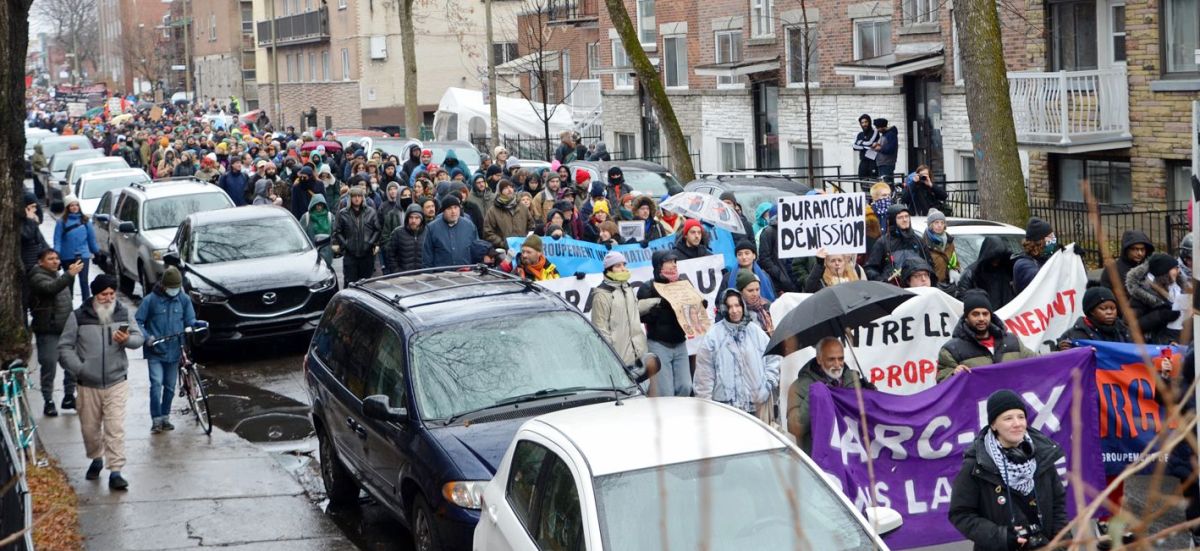
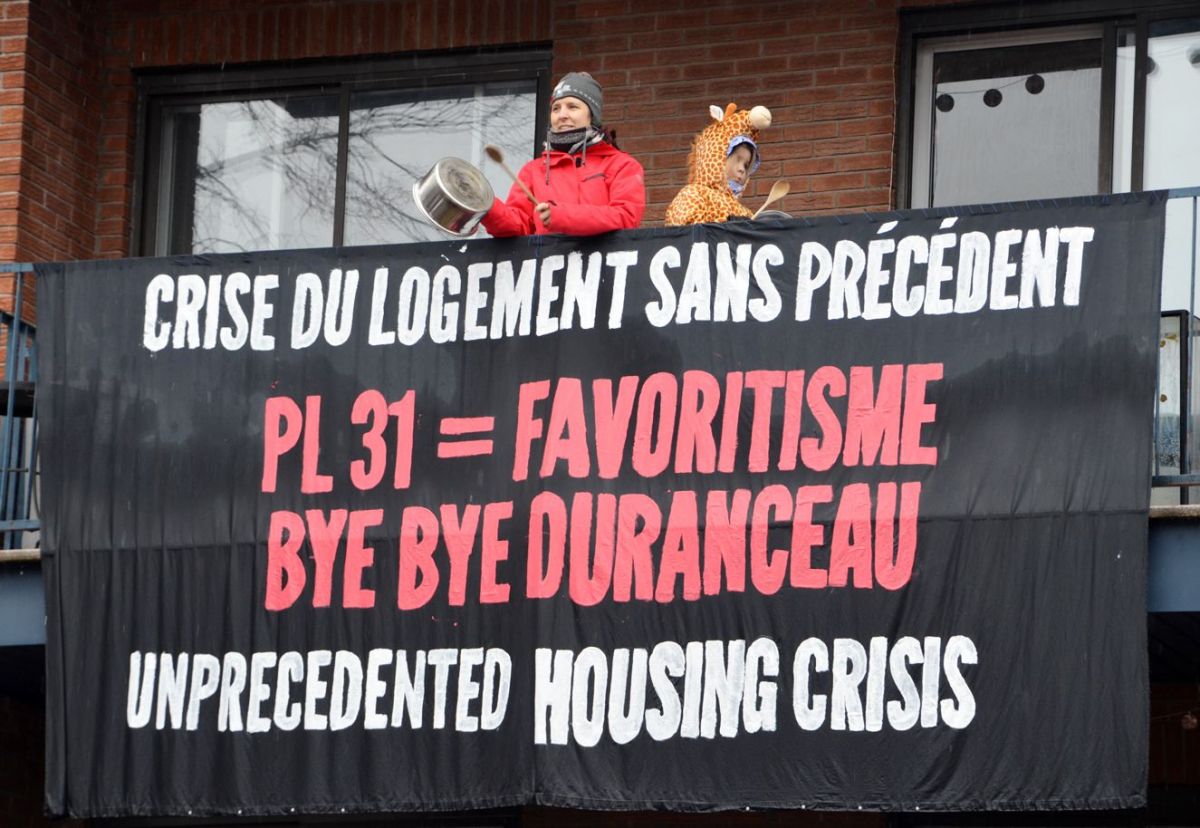
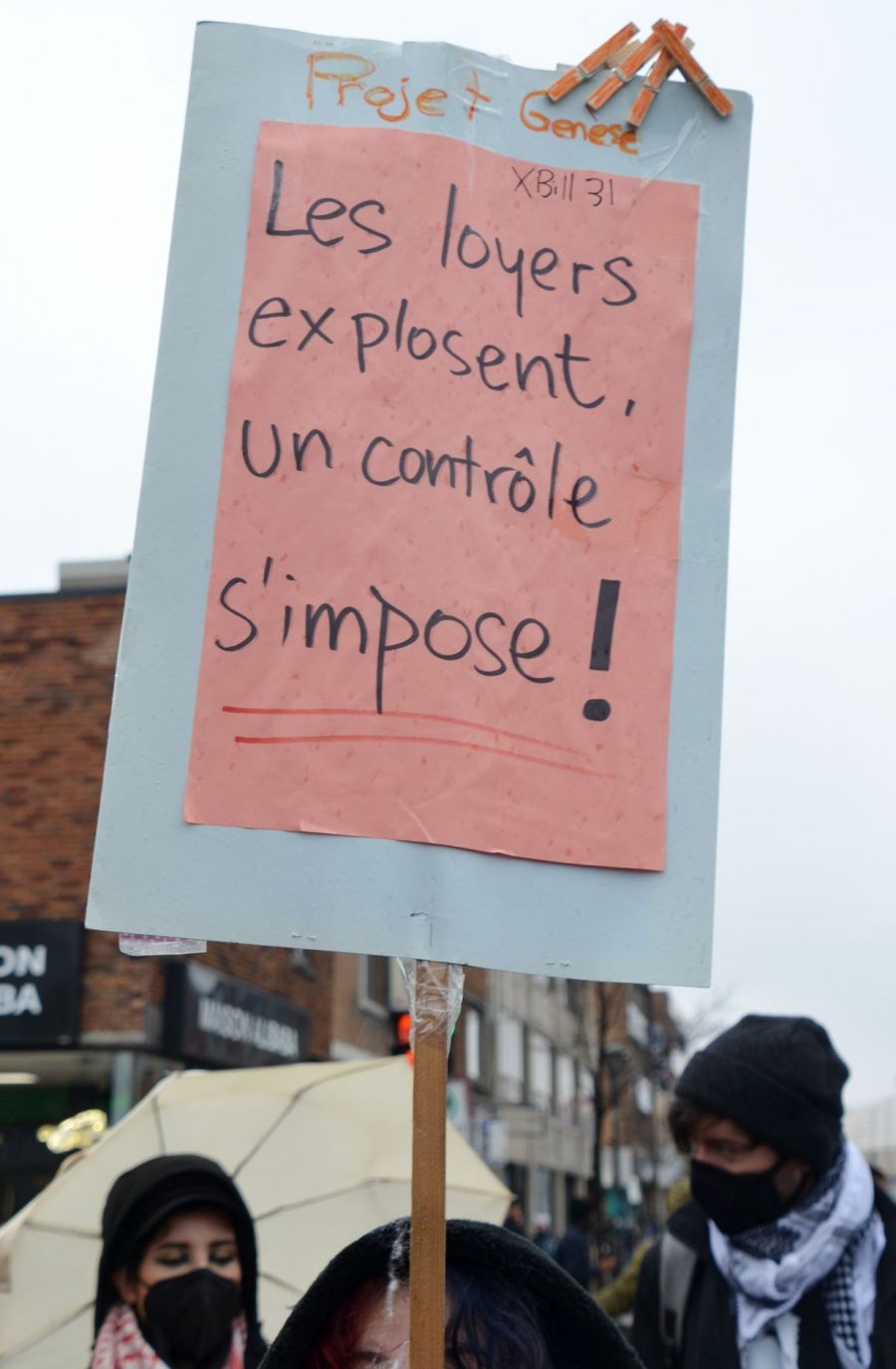
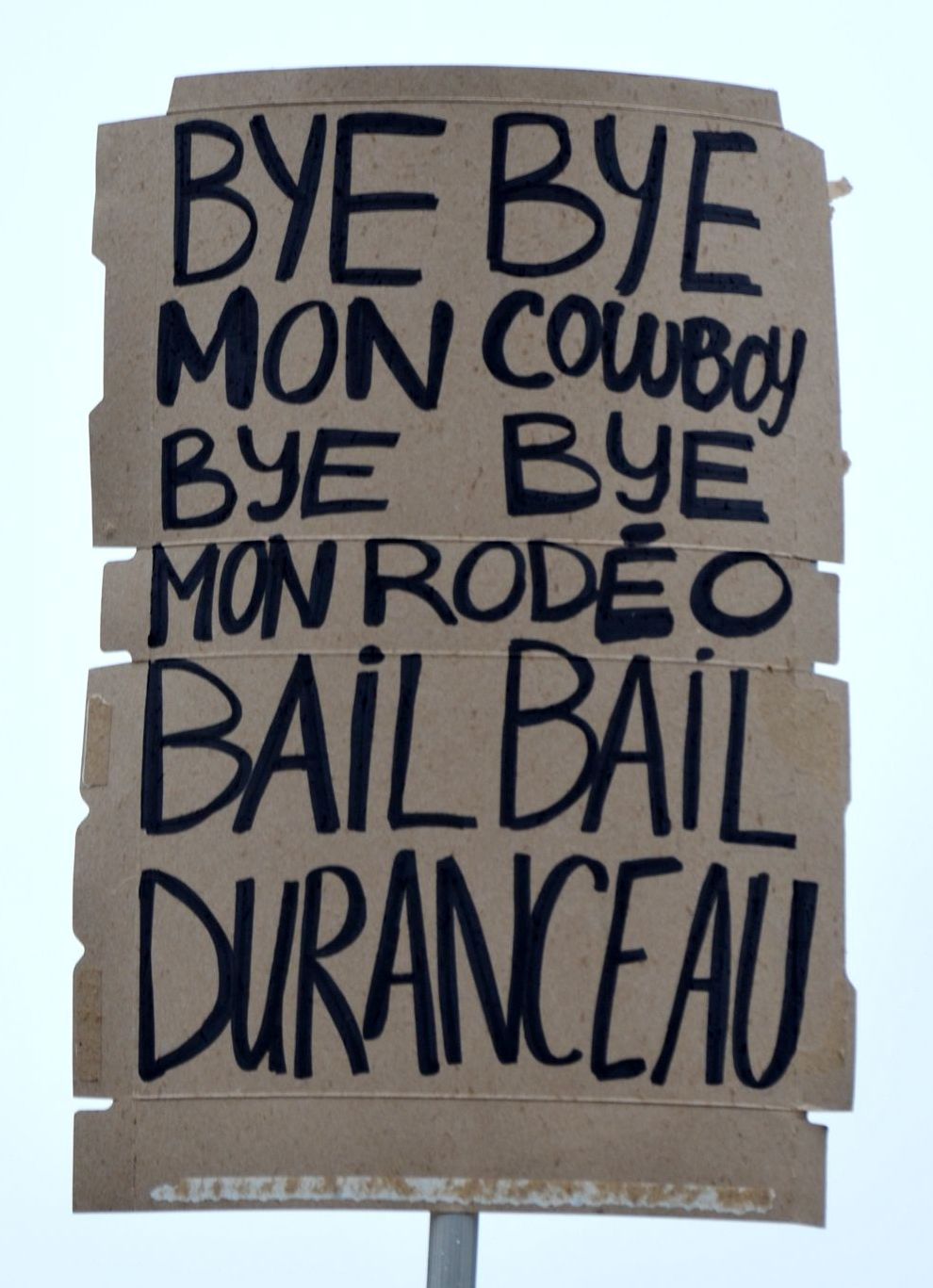
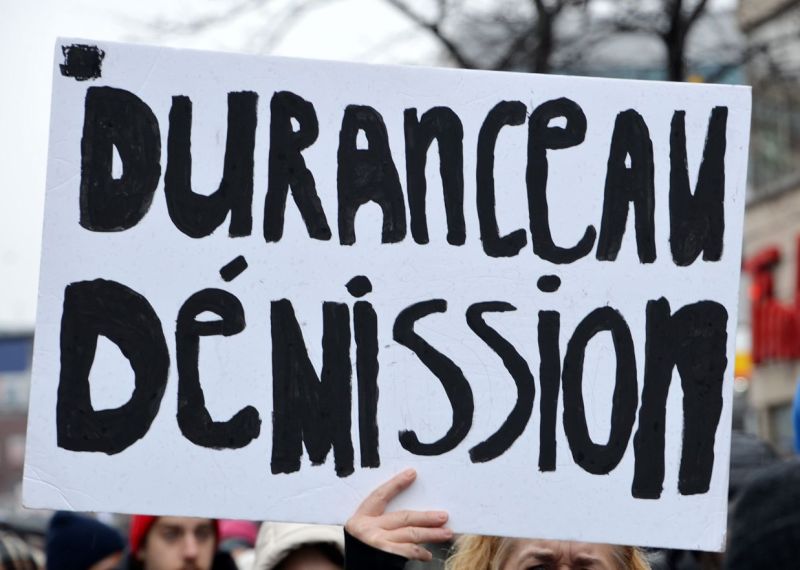
(Quotations translated from the original French by TML.)
International Migrants Day
Speak-Out in Montreal for Status for All Now!
On the morning of December 18, in the pouring rain, some 60 undocumented workers and their allies gathered outside the constituency office of Prime Minister Justin Trudeau in Montreal to once again demand status for all by way of a much-awaited regularization program he committed to two years ago, that would lead to permanent residency for the estimated 500,000 or so undocumented workers living in Canada.
The action was organized jointly by the Immigrant Workers Centre (IWC) and Solidarity Across Borders (SAB), in tandem with other events taking place Canada-wide from December 16 to 18, called by the Migrant Rights Network (MNR) on the occasion of International Migrants Day and the fifth anniversary of MNR's founding.
SAB spokesperson Samira Jasmin explained that she and IWC representative Mostafa Henaway would be delivering 400 letters from the undocumented. Addressed to the Prime Minister and Immigration Minister Marc Miller, they are to press upon them the need for a regularization program leading to permanent residency so that no one is left without status and the urgency of the situation in the face of all manner of abuse and violation of their human rights.
Although two years ago, Justin Trudeau mandated his Minister of Immigration to explore ways of regularizing the status of undocumented workers, some 500,000 undocumented workers across Canada, who contribute immensely to Canadian communities and the economy, continue to be without status. They wait, working underground as cheap labour, deprived of their rights and in constant fear of detention or deportation. They and their families are denied decent lodgings and proper health care, their children unable to legally attend school.
A large contingent of Indian migrant workers was present at the gathering as was a delegation of Algerians.
"I am proud of all the people who have come here," said Samira. "We are integrated, we speak many languages, we contribute to the economy of Canada. We are all the same, we work very hard."
Another participant spoke about the human trafficking he and others fell victim to in Montreal, by an immigration and placement agency (operating under the name Trésor) in Laval and a multinational corporation (Newrest) that provides catering and food services for airlines in Canada. At present, the IWC has undertaken legal action against them, in defence of those caught up in the scheme.
SAB also informed that on December 14, Immigration Minister Marc Miller made a promise publicly to propose a "broad and comprehensive program" that would allow undocumented persons to apply for permanent resident status.
Everyone was then asked to hand the letters they had prepared to IWC representative Mostafa Henaway, who, along with Samira, entered the building and headed towards the elevator. As it was raining, many others entered the building at the same time, to wait in the foyer while the letters were delivered to staff working at the constituency office.
Once the letters had been delivered, everyone exited the building, with Samira explaining that the Prime Minister's staff had spoken to them through a glass door, requesting that they leave the letters on the floor.
Many of the participants thanked both representatives for delivering the letters on their behalf and left more convinced than ever as to the justness of their cause and determined to continue the fight until there truly is Status For All!
(Photos: TML Monthly and Solidarity Across Borders)
Migrant Workers Speak Out in Toronto
As part of the country-wide actions demanding that the Trudeau government keep its promise of regularizing status for all migrant workers, the Migrant Workers Alliance for Change organized a spirited action in Toronto on December 16. Migrant workers and their supporters gathered at the Christmas tree in Nathan Phillips Square to deliver a message to Prime Minister Trudeau and Immigration Minister Marc Miller. One by one migrant workers spoke about their situations and the consequences of their unjust undocumented or precarious status -- unable to change employers, unable to access health care, unable to return to their countries of origin even to mourn the death of a parent or to see their children.

Syed Hussan, Executive Director of Migrant Workers Alliance for Change, criticized the government for its ongoing deportations, 39 per day, at a time when the government has promised, and reiterated its promise just days ago, to regularize everyone. He said "It is absurd and unfair to deport people today who may be regularized tomorrow." He pointed out that since the promise was made, over 21,000 people have been deported and repeated the demand for Status for All presented by all the speakers.
He explained the hypocrisy and irrationality of the current rules that migrants have to follow to achieve permanent resident status. For example, the work of most workers in health care and home care -- essential jobs -- cannot be counted towards permanent resident status. Hundreds of thousands are affected because there is no federal program that allows most of them to apply. International students are granted one-year work permits when they graduate and need to work in a higher class job for 365 days to become eligible to apply for permanent resident status. By then their one-year work permit has expired so they cannot apply and become undocumented. These work permits, he said, have been renewed three times but now the federal government says there will be no more renewals as of the end of this year so many more international students will become undocumented or have to leave the country.
With great courage all the speakers spoke of their own struggles and hardships and appealed for an end to the ongoing violation of their rights and the rights of all migrant workers, refugees and international students.
Following the speeches the demonstration moved to a busy downtown intersection where some of the hundreds of letters filled a mailbox. They pledged to keep up the fight until the goal of Status for All! is achieved.
Situation of Migrants in U.S.
The situation of migrants in the United States goes from bad to worse. It underscores the role of the U.S. government in causing migration from or within many countries, and the chaotic and inequitable dealing with the current issue of migrants to the U.S.
The U.S. government has never signed onto nor ratified the 1990 International Convention on the Protection of the Rights of All Migrant Workers and Members of Their Families. The Convention recognizes the human rights of migrant workers and promotes their access to justice as well as to humane and lawful working and living conditions. It provides guidance on the elaboration of national migration policies and for international cooperation based on respect for human rights and the rule of law. It sets out provisions to combat abuse and exploitation of migrant workers and members of their families throughout the migration process.
USians are very engaged in rectifying the situation. In the U.S., activists in Chicago wrote:
"Among the things to do is to insist that the City of Chicago open vacant schools to house migrants while assisting them to find jobs and stable housing. And we need to insist that the Biden Administration increase assistance for migrants, not cut back further on the little the government has been doing (while it spends $0.65 of every federal discretionary tax dollar for the U.S. military and wars, such as against Russia using Ukraine as a proxy or the war against the Palestinians)."
The International Organization for Migration (IOM), an office of the United Nations, stated that in 2020 there were 281 million migrants in the world and that this number is growing. [More than 60,000 migrants have lost their lives in the process of migrating since 2014, with more than 4,000 deaths recorded annually.]
Specific examples of how the U.S. government has interfered in many Latin American and Caribbean countries, causing problems for the people there and exacerbating the large number of migrants who have headed to the U.S. recently are provided by statements of the Chicago Anti-War Coalition (CAWC).
Venezuela: "As many people know, the U.S. government has been very rough with Venezuela -- with attempted coups, stealing billions, sabotage, threatening military intervention, and sanctions [because of their] political structure, which includes participatory democracy and self-determination in local areas [and] not giving up their alliance with other countries in Latin America opposing U.S. imperialism, such as Cuba or Nicaragua.
"With the $169 billion lost through U.S. attacks, Venezuela could have paid its entire external debt of $110 billion. Or had enough resources to import food and medicine for 45 years, and not have suffered the loss of 40,000 lives from lack of health care supplies."
Cuba: "The U.S. government has had a ban on most exports to Cuba that began in 1960, and then was extended into a fuller economic, commercial, and financial blockade of Cuba by President Kennedy in 1962. This has continued through 10 Presidents, Republican and Democrat.... Cuba's most recent report to the United Nations indicates that the accumulated damages caused by the blockade have reached $147,853,300,000. Biden is continuing in the anti-Cuba tradition of service to the ruling class.... [He has] signed extension[s] of the Trading with the Enemy Act... continuing all of the sanctions that have been imposed on Cuba by Trump and other presidents, and adding new sanctions, even ignoring ... the call of 114 members of the U.S. House of Representatives to lift the U.S. sanctions that prevent the delivery of food, medicine and other humanitarian aid to Cuba..."
El Salvador: "Historically, in the mid-1800s, El Salvador depended on export of indigo and then, when that market disappeared, it went mainly into coffee production, as well as sugar cane and cotton. Much of this production and railways for transport was owned by U.S. and British investors. Taking land for these crops led to attacks and break up of Indigenous communal lands and the land of other people by the Salvadoran government. Indigenous uprisings were put down with the help of U.S. weaponry supplied to the Salvadoran government. This was true for other uprisings for over a century afterward.
"The government of El Salvador was dominated by a ruling class... working with the U.S [and has] been transformed from the role of being agricultural exporters into eight conglomerates concentrating on financial schemes. The U.S. corporations played a role in this by insisting that Salvadorans use U.S. agricultural products. Many people who worked on the plantations lost their jobs....
"From 1980 to 1993 the U.S. actively worked to oppose the popular Marti National Liberation Front (FMLN) and its fight to seize political power... U.S.-backed military and death squads were responsible for the deaths of up to 80,000 Salvadorans. It intensified devastation and poverty...
"In 2006, El Salvador entered the Dominican Republic-Central America-United States Free Trade Agreement (CAFTA-DR), which gave U.S. corporations increased domination. Having U.S. industrial and commercial goods enter El Salvador duty free made it impossible for local industry to compete. The U.S. insisted on this despite big protests by unionists, farmers, and others who knew it was going impoverish them further. Then, in 2014, the U.S. insisted that the El Salvador government end any support for locally-sourced corn and bean seeds, and, instead, favour seeds imported from the U.S."
Honduras: "The U.S. also played a big role in the devastation and impoverishment of huge numbers of people in Honduras. For example, Samuel Zemurray, who made his fortune in the banana trade and became president of the United Fruit Company, the world's most influential fruit company at the time, interfered big time in Honduran politics. In 1911 he worked with a former Honduran President, Bonilla, and U.S. General Lee Christmas to launch a coup and create a banana republic. This was done with involvement by the U.S. military...
"In 2005 Honduras entered CAFTA in the face of protests from unions and local farmers who feared being out-competed by large-scale American producers. Rapidly, Honduras went from being a net agricultural exporter to a net importer, leading to loss of jobs for small-scale farmers and increased rural migration.
"The United States government under President Obama and Secretary of State Clinton backed the military coup that overthrew the democratically elected and popularly supported President Jose Manuel Zelaya in June 2009. The U.S. government has supported successor regimes and maintains a military base in Honduras...."
"Guatemala has many riches that could make it prosperous -- if those riches were not being stolen by the more than 200 U.S. and other foreign corporations and for the investors and the rich ruling class in Guatemala. They are engaged in manufacturing, agriculture, mining and drilling, and services..."
"Another area of responsibility of the U.S. is the situation of violent gangs in El Salvador as well as a growing gang presence in Honduras and Guatemala. This begins with the U.S. government not dealing with the social and economic conditions in the U.S., which has given rise to gangs seeking money and control of their lives. The U.S. government has selfishly shifted parts of that problem to countries ... by deporting gang members who then create a climate of gang control and crime and violence among the people of those countries. This is especially true of the Salvadoran youth who came to the U.S. to escape the civil war, formed gangs to defend against other gangs, and have been deported to El Salvador in large numbers."
"The Biden Administration is trying to beat back attacks on it that say it is soft on immigrants coming into the U.S. Meanwhile it also trying to appear humanitarian... It is talking about addressing 'the roots of the problem.' But it is not seriously dealing with the inequities caused by the capitalist system. As well, the situation is still that there many migrants living in squalor south of the border in Mexico hoping to be allowed entry to the U.S. after being turned away...
"Despite claims of some that the Biden Administration is creating 'open borders,' the Biden administration continues to rapidly expel most people who arrive at the southern border... including 40 per cent of all families and 90 per cent of all single adults...
"Biden has proposed legislation that will seem to be humanitarian while making it take a long time and be expensive to gain citizenship.... the U.S. Citizenship Act of 2021... includes an eight-year path to citizenship for most of the roughly 11 million immigrants living without documentation in the U.S. and calls for additional technology to be used to help secure the southern border. Senator Bob Menendez supports it because the 11 million are 'essential workers who should not be left behind...'
"This current burning matter... comes in a context where the U.S. ruling class has used and abused immigrants since the beginning days of the country. Before that, British colonies were established on a racist and profit-making basis against Native Americans and others...
"The racist nature of the U.S. ruling class toward immigrants is shown in the Naturalization Act of 1790. This allows only free white persons of 'good character' who have lived in the U.S. for two years to apply for citizenship. Without citizenship, nonwhite residents were denied basic constitutional protections, including the right to vote, own property, or testify in courts.
"Then there was the Chinese Exclusion Act of 1882 that suspended Chinese immigration for ten years and declared Chinese immigrants ineligible for naturalization even though from the 1850s Chinese immigrants were needed as cheap labour for the risky job of building transcontinental railroads, working in gold mines, agricultural jobs, and factory work, especially in the garment industry.
"In 1907, amid prejudices in California that an influx of Japanese workers would cost white workers farming jobs and depress wages, immigration was restricted.
"The Immigration Act of 1917 established a literacy requirement for immigrants entering the country and halted immigration from most Asian countries.
"The Immigration Act of 1924 limited the number of immigrants allowed into the U.S. yearly through nationality quotas that favoured immigration from Northern and Western European countries, and completely excluded immigrants from Asia, aside from the Philippines, then an American colony. In 1924, the U.S. Border Patrol was established.
"Labour shortages during World War ll prompted the U.S. government to start the Bracero Program, which allowed Mexican agricultural workers to enter the United States temporarily. The program lasted until 1964."
Bonaire
Steadfast Fight for People's Right to Self-Determination
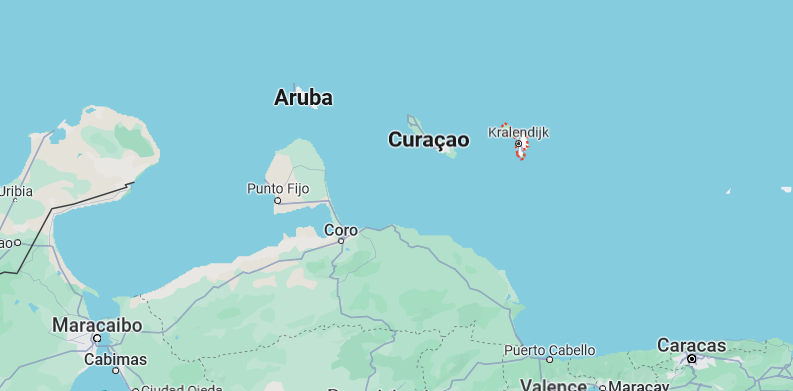 Bonaire is the small island east of
Curaçao, to the north of Venezuela.
Bonaire is the small island east of
Curaçao, to the north of Venezuela.
The struggle of the people of Bonaire for their right to self-determination has gained momentum since it was annexed and incorporated into the Dutch constitution as a "special municipality of the Netherlands" on October 10, 2010, with rights unequal to those living in the Netherlands itself. This was done without the consent of the people of Bonaire, as if they are a people subject to the colonial regime of the Netherlands.
Bonaire, one of the Leeward Islands in the Caribbean, is part of the ABC Islands -- Aruba, Bonaire and Curaçao. It is located 41 kilometres east of Curaçao and 88 kilometres northeast of the coast of Venezuela. Its population in 2019 was 20,104 inhabitants, and is currently reported to be around 24,000. Two languages are spoken there: Dutch and Papiamentu, a creole language of the Netherlands Antilles. The people of Bonaire, along with the people of Haiti and their Creole language, are among a few in the Antilles whose languages have survived colonization. The peoples of Martinique, Saint Lucia and Dominica also continue to fight to give their own Kréyol languages "official language" status.
The Dutch colonial period began in 1636, when the Dutch pushed out the Spanish, who had begun colonizing it at the start of the 16th century. In 1954, Bonaire became a member territory of the Federation of the Netherlands Antilles (consisting of Curaçao, Aruba, Sint Maarten, Bonaire, Saba and Sint Eustatius), that collectively formed a state of the Kingdom of the Netherlands. The "Law of October 10, 2010" dissolved the federation and allowed the creation of two new independent states within the Kingdom of the Netherlands -- Curaçao and Sint Maarten (each with the status of "constituent country" within the kingdom. Aruba had been given status aparte in 1986). Bonaire, Saba and Sint Eustatis were given the status of special municipalities.
Through this integration, the Netherlands imposes its laws and conditions on the affairs of the Bonarian people according to its plans of domination. The Bonarians are much opposed to these arrangements, that deprive them, their representatives and deputies of power over the development of the island and go against their interests and those of the peoples of the region. For example, the port of Bonaire was modernized under the leadership of the Netherlands, a member of NATO, to transform it into a military port used by the U.S. Army from which it can carry out interventions against Venezuela.
Bonarian James Finies refused to accept this illegal annexation and abandoned his banking career to campaign against this illegality by protesting in front of the Dutch government and governor's offices on Bonaire for 222 consecutive days, refusing to return home, to force a referendum. After gaining worldwide attention, a referendum was granted in December 2015. The question was: "Do you agree with the current status, which is directly linked to the Netherlands? Yes or No?"
During the referendum, the Netherlands -- among other trickery -- brought in Dutch nationals giving them the right to vote after three months of residency. Despite such manoeuvres, 66 per cent of citizens voted No and rejected the current illegal annexation and status. This result was ratified in the Bonarian legislature as a legal and democratic decision of the people.
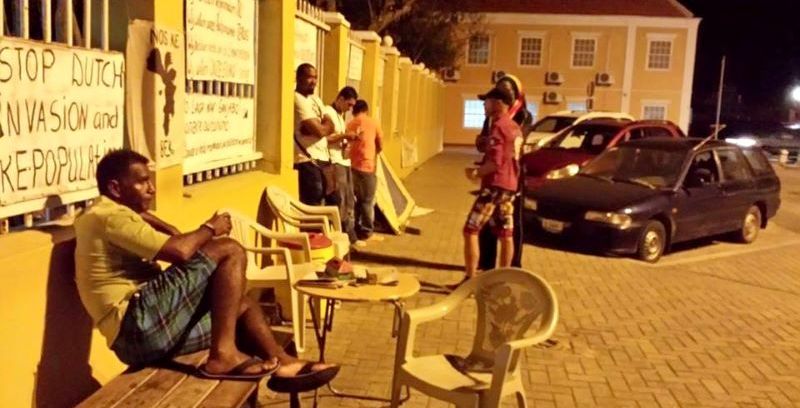 James Finies spent 222 days (24
hours a day) outside the Dutch government offices in Bonaire demanding
a referendum.
James Finies spent 222 days (24
hours a day) outside the Dutch government offices in Bonaire demanding
a referendum.
The Dutch government ignored the people's choice in the referendum. Hundreds of letters to different levels of government in the Netherlands have been sent without success. Nos Kier Boneiru Bek (NKBB – We Want Bonaire Back) was then founded by James Finies. Supported by the people of Bonaire, the organization undertook an international mission to advance their cause.
In 2016, without prior appointment, Finies; Davika Bissessar, President of the Bonaire Human Rights Organization; and many Bonarians travelled to the UN headquarters in New York. Finies spoke at the meeting of the United Nations Special Committee on Decolonization (C24) on June 22, 2016. He denounced the Dutch for crimes against his people, which violate the UN Charter and international law. After this presentation, the group met with more than 20 diplomatic missions to the UN's special committee.
Finies' intervention made public the plight of his people. It has been recommended that Bonaire be included in the United Nations' list of Non-Self-Governing Territories (UN NSGT).[1] A detailed report on the atrocities committed by the Netherlands in Bonaire was also published by NKBB so that a UN-recognized organization could independently investigate.[2] A video was also prepared discussing human rights violations and Dutch atrocities committed against the Bonarian people.[3]
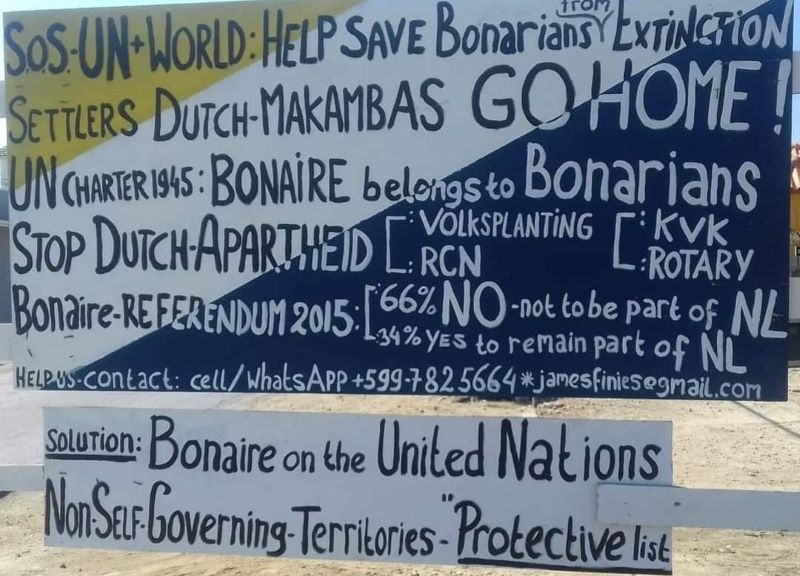 The demands of the people of
Bonaire.
The demands of the people of
Bonaire.
Since 2016, the organization has worked tirelessly to break the silence on their cause throughout Latin America and the Caribbean. The group gained the support of the Permanent Conference of Political Parties of Latin America and the Caribbean (COPPPAL) through the resolutions of Mexico (2012), Bonaire (2016) and Sint Maarten (2017), which call for Bonaire to be re-listed in the UN NSGT. They were also heard by several other organizations including the 27th International Seminar "Parties and a New Society" held in Mexico City from October 5 to 7. A unanimous resolution supporting the struggle of the Bonarian people was adopted. The next day, October 8, also in Mexico, during the meeting of the Foro de Sao Paolo working group, Finies presented the situation and a resolution of support was also adopted. Most recently, from November 28 to December 3, in Bonaire, the Eighth Contemporary Colonialism and Reparations in the Caribbean symposium was held, which was a success.
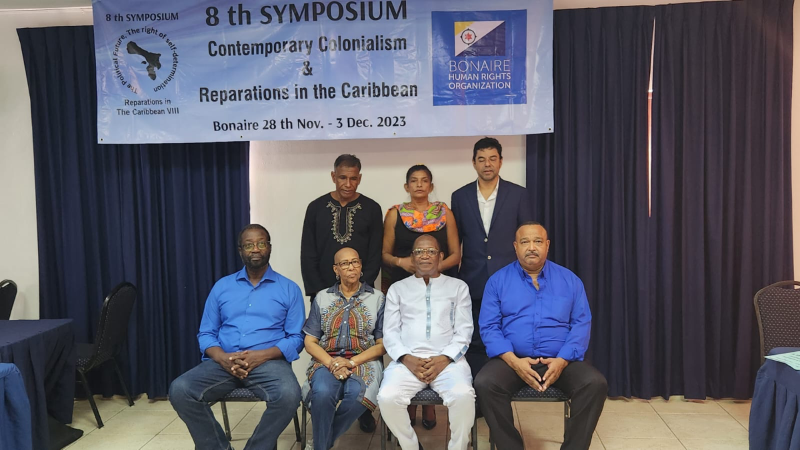 Eighth Contemporary Colonialism and
Reparations Symposium in the Caribbean from November 28 to December 3,
2023
Eighth Contemporary Colonialism and
Reparations Symposium in the Caribbean from November 28 to December 3,
2023
A people's right to be -- encompassing the right to exist, to live and to decide on all questions that concern them -- is an inalienable right for all peoples of the world, whether large or small. The people of Bonaire deserve everyone's support.
All Out to Support the Courageous
Struggle of the Bonarian People for
Their Right to Self-Determination!
Notes
1. Under the terms of Chapter XI of the UN Charter, "territories whose populations do not yet completely administer themselves" are qualified as non-self-governing. In its resolution 66 (I) of December 14, 1946, the General Assembly listed the 72 territories to which Chapter XI of the Charter applied. In 1963, the Special Committee on the Situation with regard to the Implementation of the Declaration on the Granting of Independence to Colonial Countries and Peoples (also called the "Special Committee on Decolonization" or "C- 24") approved a preliminary list of territories to which the Declaration applied (A/5446/Rev.1, annex I). Currently, 17 Non-Self-Governing Territories, remain on the agenda of the Special Committee. Administering Powers are those States Members of the UN which have or assume responsibility for administering these territories.
To see the list of non-self-governing territories to date, click here.
2. The Netherlands Antilles was the name by which the Netherlands' colonial possessions in the Caribbean Sea were referred to, from 1954 to 2010, officially named island territories: Bonaire, Curaçao, Saba, Sint Eustatius, the southern part of the island of Sint Maarten (the other portion being a French colonial territory) and Aruba. Their capital was Willemstad, on the island of Curaçao.
The Netherlands Antilles, or Federation of the Netherlands Antilles, had the status of a "constituent country" of the Kingdom of the Netherlands. In 1986, Aruba was given the separate status of another "constituent country" within the kingdom.
On October 10, 2010, the federation was dissolved. Since then, Curaçao, Aruba and the Dutch part of the island of Saint Martin each have the status of "autonomous states" within the Kingdom of the Netherlands, while the islands of Bonaire, Saba and Sint Eustatius, known as the Caribbean Netherlands, constitute municipalities with special status of the Netherlands.
The Kingdom of the Netherlands currently consists of the State of the Netherlands, the State of Aruba, the State of Curaçao, the State of Sint Maarten, as well as the municipalities of the Netherlands with special status: Bonaire, Saba and Sint Eustatius.
3. "Are the People of Bonaire Going Extinct?" November 18, 2021.
Human Rights Violations and Dutch Atrocities Committed Against Bonarian Peoples
Bonarians are fighting an uphill battle to safeguard our culture and heritage and maintain human rights from an onslaught of Dutch Immigration policy meant to make us a minority, if not erase us, in our own country. To further their intentions to decimate all aspects of sovereignty, the Dutch took draconic actions that adversely affected Bonarian autonomy.
Rights the Netherlands Is Denying the Bonarian People
First, they:
- Took border control over by Dutch Marachausee.
- Disarmed all security, even volunteer forces, and engaged in door-to-door campaigns taking away all arms -- even pellets guns.
- Expanded the foreign-dominated police station and built the world's second largest jail per capita.
Depopulation and Settlers -- Colonization:
- Open immigration -- foreign population doubled from 2010 to 2022; grew from 11,000 to 22,000 -- and Dutch European needs only an address and can vote in 90 days in local elections. In 2017, natives fell below 40 per cent, and by 2030, they will be less than one-third of the population on the way to eradication in a couple of decades.
Draconic Laws Instituted:
- Law I: Dutch Government imposed euthanasia law on elderly -- Doctors have the right to refuse medical interventions to people over 70 years old [the death rate exploded, before and after, about 60 per cent].
- Law II: Citizens' human organs are owned by the Dutch state and Dutch-owned medical system in Colombia; COOMEVA is under criminal investigation for illegal human organ trafficking of young peoples' organs who died in their facilities with minor issues.
- Systematic sterilization of our young women -- decline natural birth about 50 per cent.
- Diaspora – kids from native people [who are] born in neighbouring islands due to medical conditions, are denied reentry into Bonaire.
- Taking kids from their mothers due to poor living conditions and giving them to adoptive Dutch families, paying large sums of money to Dutch families, and leaving local mothers in poverty.
Tax and Land:
- Taxes raised to Dutch-European standards -- paying as much tax as in Holland -- and income is less than half of what (obtains) in Holland -- sending over 60 per cent of the population under the poverty line.
- Land and Property taxing -- raised 800 to 1,000% -- even NGO's sports facilities, scouting, and recreational parks are taxed excessively and taken over.
- Sale of 10 per cent of our island to a private Dutchman.
- Access to beaches denied or regulated to locals.
Poverty and Financial System:
- Changed our currency from Netherlands Antilles Guilders to U.S. Dollar; as a result -- products/food prices, cost of living raised, and wages and income lowered; bread price increased by 270 per cent.
- Changed policies to Open Market and Free Pricing in our small market led to cartels and price-explosion.
- The financial system taken over by Dutch Authority Financial Markets -- locals cannot lend anymore -- closing off all money-transfer systems such as Western Union, etc. -- closing/breaking down of all credit payment systems, cooperative systems, and credit unions that help build our island -- public housing financing and self-build housing shut down.
- Utilities such as water and electricity were taken over by Dutch Authority Consumer Market -- before, a couple/household paid about $100-200 per month -- last month, September [2022], same household bill was $1,000 -- cut off and re-connection charges are very high.
- Over 60 per cent of the population now exists below the poverty line -- reports from KITLV [Royal Netherlands Institute of Southest Asia and Caribbean Studies], NIBUD [Netherlands National Institute for Family Finance], Dutch Human Rights, Ombudsman, Greenpeace, Child Rights, etc.
Education and Culture:
- All levels of education -- changed to Dutch norms -- reversing our education from native Papiamentu to a foreign language -- violation of Bonaire children's human rights of education in the native mother tongue -- our native kids sent to lower levels of education -- segregation of our youth.
- Demoting and firing local teachers and replacing them with Dutch-speaking teachers.
- Giving Dutch teachers incentives to migrate -- tax incentives/double household premiums, etc.
- Vocational and second chance education -- using lack of fluency in Dutch to demote students.
- Making Bonaire attractive for Dutch interns -- giving jobs, which are retained as head or manager.
- Cultural events -- the existence of Carnival, Rincon Day, and regatta all heavily threatened.
- Fishing, hunting, our way of life are all heavily restricted and regulated, preventing locals' access to their natural food resources.
- Sea border control -- heavily armed coastguard; fishermen, and cultural event regatta, held up and searched at sea and intimidated as terrorists or criminals.
Institutional and Business Sector:
- Heads of governmental institutions were demoted and replaced by migrating Dutch Europeans.
- Local businesses were back-taxed and regulated out of business, and the Dutch took over all local businesses.
- Local Tourist Market -- regulated and taken over by Dutch.
- Now even gardeners, painters, etc., are Dutch.
The Question Is What Holland Gained From This Illegal Annexation
With the annexation of Bonaire, the Government of Holland gained the following:
- Full political and legislative power and control over the island.
- 200 nautical Exclusive Economic Zone sea miles of the Caribbean Sea.
- Complete control over the local airport [and has] engaged in continuous expansion, developing the airport to military standards. And since Bonaire is only 50 miles from Venezuela, with which the USA and the West have an ongoing conflict, the West may use Bonaire as a potential NATO base to pacify Venezuela and the region. The future of Latin America poses a threat of a possible NATO base in front of the coast of South America.
UN Charter and International Law Violated by the Dutch
The after-effects of the enslaved [continuous agitation for freedom] and colonized people's struggle for independence and equality gained momentum in the aftermath of the devastation of World Wars I and II. With over 80 million human lives sacrificed, nations had a new consciousness: no people, no government, big or small, should be held in bondage by another country as all countries should be free and equal to everyone else. That was the unique promise to mankind and hence the birth and the main objective of the United Nations, to maintain international peace and security based on respect for the principle of equal human rights and self-determination of all peoples.
Bonaire's status does not comply with self-governance standards and represents an incomplete decolonization with a fundamental power imbalance between the territory and the cosmopolis. These contemporary dependency arrangements characterized by political inequality do not meet the standards of democratic governance and merely represent incomplete decolonization, as Bonaire's dependency status was a preparatory phase to complete decolonization with a Full Measure of Self-Government with Absolute Political Equality.
The people of Bonaire have an inalienable sacred fundamental Human Right to Self-determination as guaranteed in several International Instruments, which the Netherlands is blatantly violating:
- Cosmopolis that maintain territories and territorial arrangements in the Caribbean should adhere to their international responsibilities under the United Nations Charter to advance the territories under their administration to the Full Measure of Self-Government.
Bonaire's civil society Non Government Organization (NGO) commissioned the Dependency Studies Project to do an investigation/assessment of the level of democracy and self-governance in Bonaire. This will be the first time in history that such an undertaking is done by a civil society NGO as governments do these. Due to the high cost of this investigation, we had to raise funds through BBQ, donation drives, lottery, and donation boxes for over three years. A humble Bonarian who wanted to remain anonymous sold a piece of land to help fund the investigation.
Assessment of Self-Governance Sufficiency in Conformity with Internationally Recognized Standards: Country Bonaire
The assessment concluded:
"The inalienable right to self-determination did not lead to a transformational process of decolonization and democracy -- but was replaced with a distorted process resulting in the cruel hoax of colonial reform with the Dutch perpetuating the inequality that the process was supposed to replace. It is to be observed that dependency governance is not democratic governance, just as colonialism is not democracy. The public entity renamed 'territorial public body' is one of several global dependency governance models erroneously projected in the 21st Century as forms of democracy and applied in a fashion that circumvents the inalienable right to genuine self-determination under international law. This is how the scenario has evolved for Bonaire."
The conclusion is that any projection of Bonaire as a model of democratic governance is illusory at best -- deficient by all measures of democratic governance. However, while colonialism remains an oppressive illegal form, its illegality and oppressive nature is often a matter of power, not justice. This is the fundamental challenge to the contemporary process of self-determination and its consequent decolonization for island jurisdictions such as Bonaire.
UN Recognized Report
This assessment is recognized and accepted by the UN General Assembly as an independent report/assessment as it contains UN General Assembly-approved self-governance indicators used for the investigation/report. It must be noted that this type of report was one of the key documents used in successfully re-listing French Polynesia in 2013 as an NSGT [Non-Self-Governing Territory] under the UN against France.
By having Bonaire placed on the list of NSGT, the Dutch government would be obligated, as a member according to articles, resolutions, and treaties of the United Nations Charter, to comply with the following. The Dutch must report annually to the General Assembly on the island's social, economic, and political advancement, as mandated by article 73 of the charter of the United Nations. Furthermore, the re-listing will allow the supranational organs of the United Nations to assess and intervene, help and support the island where necessary, and supervise all activities and actions that lead towards decolonization and self-governance.
Once these measures are respected, Bonaire will be on the road to reclaiming its inherent right to self-determination and joining the community of nations as a sovereign state since size should never deter a country's right to live freely.
Mr. James Finies is the President of Nos Kier Boneiru Bek and Vice President of Bonaire Human Rights Organization. An indigenous Bonarian, Mr. Finies has campaigned for decades to expose the Bonaire colonial situation and raise awareness of human rights violations and the self-determination rights of the people of Bonaire.
(December 20, 2022. Edited slightly for this publication.)
Venezuela -- Guyana
Beneath the Surface of Border Dispute
 Presidents
Nicolás Maduro and Irfaan Ali, of Venezuela and Guyana,
respectively, in St Vincent and the Grenadines, December 14, 2023
Presidents
Nicolás Maduro and Irfaan Ali, of Venezuela and Guyana,
respectively, in St Vincent and the Grenadines, December 14, 2023
 On
December 14, the Presidents of Venezuela, Nicolás Maduro, and
Guyana, Irfaan Ali, met in St Vincent and the Grenadines against a
backdrop of rising tensions between the two governments over the fate
of the disputed territory of Essequibo. The gap between their positions
was exemplified by the
statements they issued in the lead up to the meeting. Maduro welcomed
the talks as an opportunity to take "the path of dialogue with Guyana,
in order to achieve a practical solution to the controversy," while Ali
stated that "the land boundary is not a matter for bilateral
discussions."
Notwithstanding these divergent opening statements, at the end of the
meeting both governments signed the Argyle Joint Declaration in which
they committed to, among other things, avoid the threat or use of force
between them, avoid escalating their dispute, continue their dialogue
and meet again
in Brazil.
On
December 14, the Presidents of Venezuela, Nicolás Maduro, and
Guyana, Irfaan Ali, met in St Vincent and the Grenadines against a
backdrop of rising tensions between the two governments over the fate
of the disputed territory of Essequibo. The gap between their positions
was exemplified by the
statements they issued in the lead up to the meeting. Maduro welcomed
the talks as an opportunity to take "the path of dialogue with Guyana,
in order to achieve a practical solution to the controversy," while Ali
stated that "the land boundary is not a matter for bilateral
discussions."
Notwithstanding these divergent opening statements, at the end of the
meeting both governments signed the Argyle Joint Declaration in which
they committed to, among other things, avoid the threat or use of force
between them, avoid escalating their dispute, continue their dialogue
and meet again
in Brazil.
In a 2004 visit to Guyana, the then president of Venezuela, Hugo Chavez, described the border controversy as "a legacy of colonialism and the subject of imperialist intrigue to create enmity between Guyana and Venezuela." His words remain as true today as 19 years ago. Currently, a dishonest narrative is being spun that, "Venezuela wants to attack Guyana and take 70 per cent of its territory and as Caribbean people we should stand with our brothers and sisters in Guyana against the unjustified Venezuelan land grab." This dishonest narrative is intended to mobilize the people of the Caribbean to defend the plunder of the region's resources by ExxonMobil and other foreign monopolies and to support the U.S. militarization in support of this plunder.
Roots of Dispute
The roots of the dispute lie in the conflicting claims of Spanish and British colonialists to the territory they stole on the South American mainland with the aim of exploiting the region's land and mineral resources. From the early 1500s, the Spanish empire encouraged migration from Europe into the area which now constitutes Venezuela. This European settler colonialism brought with it abuse and enslavement of the Indigenous people and of Africans imported into that territory. In a process similar to the one which led to the establishment of the USA in North America, the descendants of the European settlers launched armed struggle to proclaim independence from the Spanish empire. Venezuela emerged in 1811 as the first of these territories to declare independence, before being integrated into Gran Colombia by Simon Bolivar in 1822. It is important to note that although Bolivar is widely described as the Liberator, the enslavement of Africans in what is now Venezuela continued until 1854, despite Bolivar's promise in 1815 to the Haitian revolutionary government that he would abolish African enslavement in the territories he liberated from Spain. Therefore, unlike Haiti which abolished slavery in 1804, the independence of Spain's colonies was not a fully emancipatory process and, like the USA, these new states carried with them into their independence much of the racist and oppressive baggage inherited from the Spanish empire.
In the middle of the 19th century, Britain, using its position as the main superpower at the time and taking advantage of political instability in Venezuela, launched a land grab. It laid claim to the region of the Essequibo, which had previously been claimed by the Spanish empire, and added this territory to its colony of British Guiana. In effect, the British Empire seized land that Venezuela felt it had a right to inherit on the basis that the Spanish empire had previously seized it from the Indigenous people. This is the imperial essence of the dispute. The protests of the Venezuelans eventually led in 1899 to the Paris Arbitral Award whose ruling legitimized the British land grab and fixed the current boundary between Venezuela and Guyana. In 1949 Severo Mallet-Prevost, who had been appointed by the USA to represent Venezuela at the Paris Arbitral proceedings, since the Venezuelans were not present there, posthumously published a memorandum in which he described the corrupt practices that Britain had undertaken to achieve the results of the 1899 Award. Consequently, Venezuela raised this matter at the UN in 1962, and in the lead up to Guyana's independence in 1966, a new agreement, the Geneva Agreement, was signed between Britain, Venezuela and the yet to be independent Guyana in order to find a solution to the border issue.
Imperialist Intrigues
However, the imperialist intrigues which had given birth to the controversy continued under the conditions of the Geneva Agreement. It is clear that the hands of the U.S. and its trans-national corporations are never far from the aggravation and flaring up of this issue from time to time. For example, in the 1980s when Forbes Burnham was president of Guyana, the CIA accused him of trying to set up a Cuban military bridgehead in that country and actively used Venezuela, which at that time was one of its client states, to destabilize Guyana by aggravating the border dispute. Speaking on this issue at the 20th Summit of the Rio Group in 2008, Hugo Chavez stated that, "back in the day, when Guyana was governed by this left-wing guy, Forbes Burnham, there was almost a war between Venezuela and Guyana, for an old territorial dispute, that almost no one remembers, because it had been sitting there since time immemorial ... American officials came, I remember, to warmonger against Guyana ... they wanted us to invade Guyana, using the territorial dispute as an excuse, to oust the left-wing government of Forbes Burnham." In fact, in 1981, in the context of the threats being levelled against Guyana by the then Venezuela government, Cuban foreign minister Ricardo Alarcon, on a visit to Guyana, denounced Venezuela as expansionist and declared Cuba's solidarity with Guyana. It is one of the ironies of history that while in the 1980s, the U.S. was instigating Venezuela to destabilize Guyana by using the border dispute as a pretext, today the tables have turned and the U.S. is instigating Guyana to destabilize Venezuela, using the same border dispute as a pretext.
Following the signing of the Geneva Agreement, the border dispute, like many others around the world, rumbled on without Guyana and Venezuela being able to resolve it. As per this agreement, the two countries referred it to the good offices of the UN Secretary-General in 1990 to see if this could lead to a solution. As late as October 2013, some 23 years after the referral, the Secretary-General's personal representative, Mr. Norman Girvan, reported that he had held very productive separate meetings with the foreign ministers of Guyana and Venezuela, both of whom emphasized the excellent bilateral relations that then existed between the two countries. Both countries acknowledged the progress that had been made using the Good Offices process, expressed confidence in it and welcomed further initiatives from Mr Girvan to move towards a solution.
On May 20, 2015 ExxonMobil announced that it had made a significant oil discovery in the seas off Guyana. After that, everything changed.
Violating Geneva Agreement
In December 2016, the then UN Secretary-General Ban Ki-moon wrote to both Venezuela and Guyana, stating that he would terminate the Good Offices process at the end of 2017 and that if by then the controversy had not been resolved, he would "choose the International Court of Justice as the next means of settlement, unless the Governments of Guyana and Venezuela jointly requested that he refrain from doing so." Ban Ki-moon's action was an open violation of both the principles and text of the Geneva Agreement which represented the legal basis on which he was involved in the border dispute in the first place. The agreement makes it clear in its preamble that the dispute should be "amicably resolved in a manner acceptable to both parties" and its Article IV (2), on which the Secretary-General claimed authority to unilaterally impose a solution on one of the parties, provides him with no such authority. It states, that:
"If the means so chosen do not lead to a solution of the controversy, the Secretary-General of the United Nations shall choose another of the means stipulated in Article 33 of the Charter of the United Nations, and so on until the controversy has been resolved or until all the means of peaceful settlement there contemplated have been exhausted." Article 33 (1) of the UN Charter reads,
"The parties to any dispute, the continuance of which is likely to endanger the maintenance of international peace and security, shall, first of all, seek a solution by negotiation, enquiry, mediation, conciliation, arbitration, judicial settlement, resort to regional agencies or arrangements, or other peaceful means of their own choice."
It is clear from reading both the text of the agreement and Article 33 of the UN Charter that the Secretary-General's action was born of the very imperialist intrigue that Hugo Chavez highlighted. First he breached the principle outlined in the preamble that a solution acceptable to both parties needed to be found. Secondly, he failed to exhaust all the possibilities listed in Article 33 for seeking a peaceful resolution and, finally, he contradicted the requirement in Article IV (2) that the measures listed in Article 33 should be gone through "until the controversy has been resolved." Obviously, if a means of dispute settlement is imposed on one party, that party is going to feel that an injustice has been done to it and so the controversy will not be resolved. It is crystal clear that the agreement did not give the Secretary-General any authority to impose a solution on one of the parties as Ban Ki-moon advocated. However, in January 2018, his successor, Antonio Guterres, carried through with the anti-Venezuela intrigues and selected the International Court of Justice (ICJ) as the means to be used to settle the border dispute. Following this decision, Guyana instituted proceedings against Venezuela at the ICJ in March 2018.
The involvement of the ICJ in the imperialist intrigues around this dispute is another example of the use of the so-called international legal institutions for the naked pursuit of the political and geo-strategic objectives of the U.S. and its trans-national corporations. This practice only brings these organizations into further disrepute and destroys the remnants of whatever legitimacy they may have once had. For example, the same ICJ on March 16, 2022, less than three weeks after Russia began its "special military operation" in Ukraine, issued provisional measures against Russia which demanded that it immediately end its military actions in Ukraine. However, over two months into what has been described as the first televised genocide taking place in Gaza, the ICJ has issued no provisional measures or anything else against Israel. Venezuela obviously understood that the referral to the ICJ was an attempt to repeat the 1899 Arbitral award injustice, but this time in the service of U.S. rather than British imperialism. It recognized that agreeing to it would be tantamount to accepting ExxonMobil and the U.S. as the final judges on this issue. It has therefore rejected the involvement of the ICJ in the matter.
The current People's Progressive Party (PPP) government in Guyana, on the other hand, likes to make a virtue of its commitment to "abide by the ICJ ruling." But this stand only exposes the fact that they are up to their necks in the U.S. imperialist intrigues against Venezuela. The PPP has been screaming about defending the territorial integrity of Guyana, going so far as to involve the U.S. Southern Command in the dispute. However, now it wants the world to believe that it would willingly surrender 70 per cent of Guyana's territory to Venezuela, if the ICJ made such a ruling. This is particularly striking given that in the ICJ process there is no possibility of appealing a ruling. If that is really the stance of the PPP, then this organization definitely has no commitment to the territorial integrity of Guyana. In reality, the PPP touts its position because the U.S. and ExxonMobil have made it clear to them that the ICJ will produce one result and one result only, namely a ruling in favour of ExxonMobil. The U.S. strategy is clearly to engineer an ICJ judgement on Essequibo in its favour and then use its Southern Command to enforce it. Unfortunately, the PPP is complicit in this intrigue. This complicity is a sign of how far the PPP has degenerated. It is a long way from the party of 1953 led by Cheddi Jagan and Forbes Burnham which stood for the people of Guyana, leading to the U.S.-backed October invasion that year, in which Britain violently overthrew the elected PPP government. Seventy years later, the PPP has degenerated into a willing instrument in the hands of U.S. imperialism.
A People-Centred Solution
The Venezuela-Guyana border dispute is an open sore, which external, imperial forces pick at and aggravate whenever it suits their interests. In doing so, they threaten peace and security in the Caribbean. Today in contravention of the Community of Latin American and Caribbean States (CELAC) declaration that the Caribbean should remain a zone of peace, there is talk of the U.S. establishing a military base in Guyana to defend the ongoing plunder of the oil resources which sees ExxonMobil take 86 per cent of the revenue and leave 14 per cent for Guyana.
For over 100 years, attempts to resolve this dispute have been based on the Eurocentric, colonialist concept that a country is a land mass and the resources it contains exist only for exploitation and profit. These attempts have so far failed miserably. It is time to abandon this approach and find a people-centred solution to the dispute. As long ago as the 13th century, the people of Mali had concluded that to speak of a country is first and foremost to speak of its people. This is what needs to be put at the centre of efforts to resolve the dispute. Today the Indigenous people who live in the Essequibo crisscross the so-called international border in ways that they have done for thousands of years, paying no attention to this foreign imposition. It is absurd that in 2023, claims to the Essequibo are being made on the basis of the colonial crimes of the Spanish and British empires with no one taking account of the views of the Indigenous people. It is a crime that the oil resources associated with this region have been handed over to foreign corporations to plunder to the detriment of the people of the Essequibo, Guyana and Venezuela.
Across the Caribbean, we must demand that both Venezuela and Guyana stop escalating the situation, stop involving the U.S. corporations and military in the dispute, stop participating in imperialist intrigues and pivot instead to a search for a solution which starts with the involvement of the people of both countries, particularly the Indigenous people of the Essequibo, to finally resolve this matter in a way that benefits the people and not foreign monopoly corporations.
(Caribbean Organization for Peoples Empowerment, December 15, 2023)
Trinidad and Tobago on Brink
Assault on Our Right to Safety and Security
It has become fashionable these days for Government Ministers with security responsibilities and top Police officials in speeches, media releases, interviews and social media posts to now speak of 'protecting' or ensuring the 'right to safety and security' or the 'safety and security of our citizens.'
Why fashionable? Because until the discussion on the savagery of the 'runaway' murderous criminality has begun to be framed in the context of the Right of All citizens to Safety and Security and the duty of the State to give a guarantee to that Right, as with all other of our fundamental Rights, the discussion was being framed by officialdom as a 'law and order' issue, a public health emergency, etc.
Now, we come to the nana of the matter. Every citizen, by our Constitution, our society's highest law, is to be guaranteed certain fundamental Rights, Safety and Security, like Health being uppermost since without Life we can enjoy no other Right.
Crime and violent crime are now rampant. The perpetrators are increasingly brazen and acting with impunity, no longer even bothering to hide their faces and daring, with no cover of darkness sought.
The media conferences and photo ops following every new outrage; the 'gun talk' and threats via traditional and social media by the top cop or her senior executive and police spokespersons -- "We Are coming for you" or "Don't come back in this area" have all become too commonplace and like the brazen acts of savagery are received with little or no reaction by a population numbed by the regularity and the realization that "nowhere is safe."
"Keep safe" have now become the customary parting words at the end of every social encounter by beleaguered citizens who see no light at the end of the tunnel but can only contemplate our descent into anarchy.
At his media conference yesterday, on his return from his assignments abroad, the Prime Minister was forced to address the "issue" of crime and in particular, the news report of some police having brokered a peace treaty among named gang leaders in the capital city.
Gang activity is criminality, he retorted.
We have the Anti-gang laws, he said.
Well, we have laws against murder, shooting with intent, illegal possession of weapons including high-powered automatic guns, illegal drugs, trafficking in persons, extortion, home invasions. Our statute books are well populated with criminal statutes defining a myriad of offences and even of late, explaining your wealth legislation.
Yet, for all this law, there is no order.
The Prime Minister repeated that the principal agency for fighting crime and ensuring that those who break all those laws are 'brought to account' is the Police, up to recently it was also fashionable to speak of some nebulous 'law enforcement.'
So, if we have so many laws, if we have a police service as primary crime fighting force, why are we still not having our Right to Safety and Security guaranteed.
Well, the PM reassured us that we are buying more police vehicles to carry police whose ranks are to be increased by 1,000 in 2024 and soldiers who we have called out for four months as part of 'providing all the support' that is the Government's duty to do.
But, what of the efficiency and effectiveness of the work of the Police and the other apparatus of security fighting against the 'runaway' crime?
In the world of measurement of performance of either individuals or organizations, modern performance management uses several tools to quantify and analyze, efficiency and effectiveness and an important standard of performance measurement is to begin with identifying Key Performance Indicators (KPIs) and setting targets.
In measuring the efficiency and effectiveness of the performance of the police in combatting crime, important KPIs are the Detection and Conviction Rates -- how many of the reported offences are detected (i.e., arrests and charges made and laid) and how many of those detected end in convictions in the criminal justice system?
The Police have repeatedly told us that policing is intelligence-driven and almost daily tell us of crimes and detection "compared for the same period last year" and so on.
The Police keep or are required to keep the numbers daily and there is even a branch responsible for compiling the statistics and they are further reported in the statistics presented by the Central Statistical Office (CSO) providing us with a panoramic view of the crime and detection rates from 1975 to present.
The last Manpower Audit conducted into the Police Service includes those KPI statistics for 1994 -- 2022.
What Do the Statistics Show
The tables can be found on the CSO website here.
Crimes Reported 1975-2022
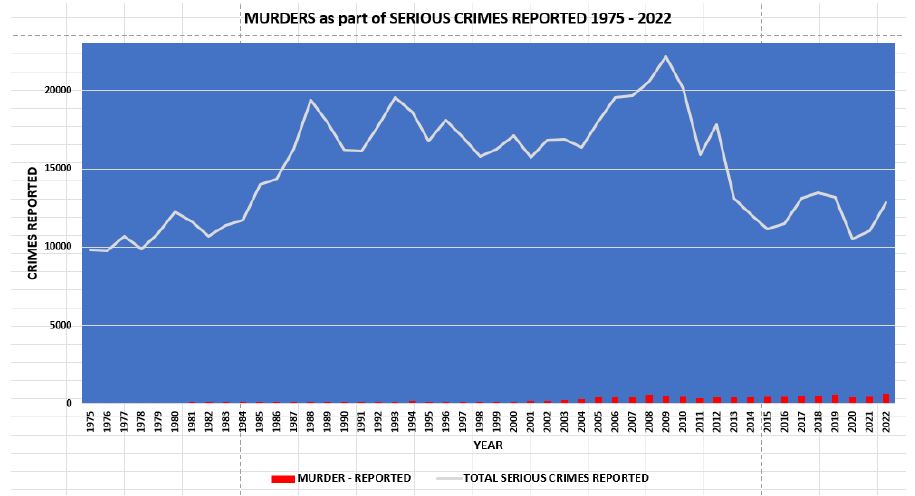
Look at the total serious crimes reported and murders as a proportion of that total.
Serious crimes reported have increased from less than 10,000 in 1975 to a high of over 20,000 in 2007-2009 but have never returned to the 1975 levels.
Murders (shown in red in graph below) have increased continuously and more so since 2000.
However, while murders are of most concern to the population and despite the record annual murder tolls up to more than 600 in 2022, murders remain a relatively small proportion of total serious crimes for each year.
Here is a running time series from the CSO based on police statistics of the murder tolls since 1975 to 2022.
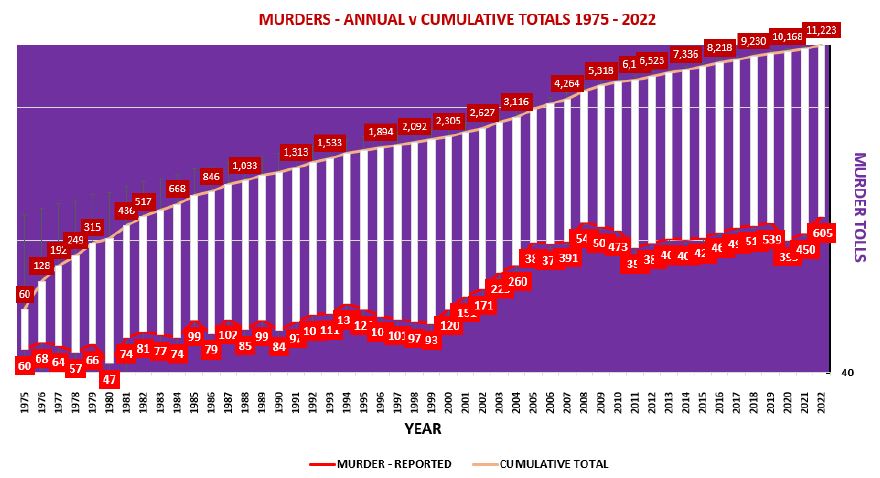
The annual murder tolls have never returned to below 200 since 2002, for 21 years.
In the last two decades, more than 500 citizens have been murdered in seven of those years including this year, 2023 and more than 600 in 2022.
There have been more than 400 murders per year in 13 of the last 20 years.
Between 2002 and 2022, 20 years, a total of 8,607 citizens have been murdered in this country.
Detection Rates (%) -- 1975-2022
Now to the comparison of crimes reported to crimes detected and the detection rates and how they have varied over the last 48 years.

Between 1975 and 2022, the detection rates for all serious crime have remained almost steady from 20.7% in 1975 to 16.4% in 2022 with a low of 0.4% in 2007.
The detection rate (percentage of reported crimes detected) has never returned to the 1975 level in 47 years.
Between 1975 and 2022, the detection rate for murders has plummeted from 88.3% in 1975 and a high of 94.6% in 1981 to less than 20% since 2012 and a low of 13.1% in 2022.
When viewed over the long-term, the recent concern expressed by the National Security Minister for the low detection rate for murders seems to come at least two decades too late, murder detection rates have never returned to anywhere near the 1999 rate of 72%.
These statistics over a period of almost five decades paint the picture that:
- Serious crime has escalated in the mid-1980s and has never been reduced to pre-1980 levels.
- Serious crimes (reported) have exceeded 15,000 per year for every year between 1987 and 2014.
- The detection rate for all serious crimes has never exceeded 20.7% since 1975.
- The crime scourge has been a very serious issues for at least 35 years and is not a recent development.
- Between 1975 and 2002, the annual murder toll never exceeded 200 and since 2003 record murder tolls have escalated reaching 600+ in 2022 and crossing 500 six (6) times including 2023, the current year.
- 11,223 citizens have been murdered since 1975, more than 9,000 since 2001.
- The detection rate for murders has plummeted from more than 50% up to 2001 to 13.1% in 2022.
What this shows is that the efficiency and effectiveness of the Police Service in combatting the explosion of crimes of all types, and more so the wanton slaughter of citizens by murderers, leaves a lot to be desired, to say the least.
The suggestion that somehow the explosion of serious crimes and of murderous criminality was caused by the 1990 coup attempt cannot be supported when one takes the long view of the facts recorded since 1975.
Apart from the obvious need to step up the efficiency and effectives of the Police Service in detecting and preventing crime, it is obvious that the clichéd pronouncements about bad parents, sinful nature of man, blaming the youth, blaming the gun manufacturers and so on cannot explain the causes of the scourge of criminality and murderous criminality that is plaguing our society, for decades now.
Without determining the root causes, there can be no effective "war on crime," and "law and order" measures will not provide any guarantee for the Right of Safety and Security for all citizens.
(November 21, 2023)
Republic of Korea
Broad Resistance to Anti-Social and Warmongering Policies of Yoon Government
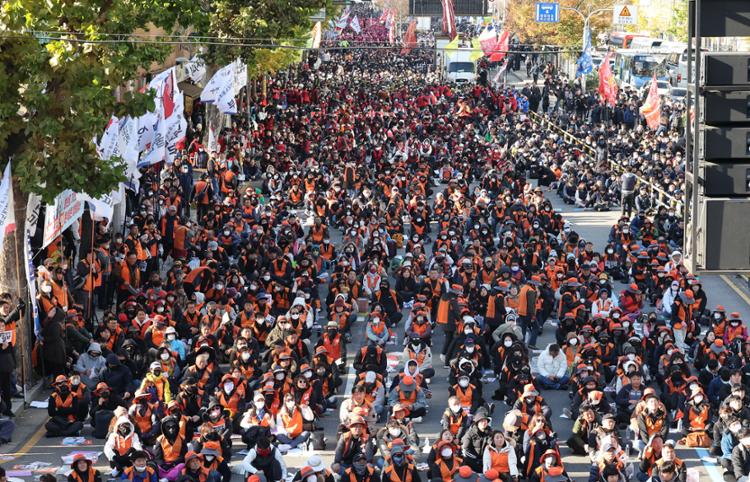 Federation of Korean Trade Unions
(FKTU) rally in Seoul, November 11, 2023.
Federation of Korean Trade Unions
(FKTU) rally in Seoul, November 11, 2023.
Since coming to office in May 2022, the pro-U.S., anti-communist government of President Yoon Suk-Yeol of the Republic of Korea (ROK), has carried out a broad anti-social offensive against the people and at the same time integrated the ROK more deeply into the U.S. imperialist war machine and its aim to dominate the Asia-Pacific region. This has threatened the peace and well-being of the Korean people and the peoples of the region.
In response, the Korean people have organized one protest after another in Seoul and other cities across the ROK since Yoon's government took power, demanding Yoon's resignation and a reversal of his anti-social and warmongering policies. Several actions were held in Seoul in November.
On November 20, the South Korean Confederation of Trade Unions held a rally declaring a general strike for workers' rights. The 65th candlelight demonstration in Seoul on November 18 called for the reversal of Yoon's anti-social policies and for the protection of workers' rights and social programs. Protesters carried signs and banners calling for the ROK National Assembly to impeach Yoon.
The "Emergency Situation Council for Preventing Prosecutory Dictatorship, Ruin of the People's Living and the War Crisis" held a rally on November 15 condemning "traitor Yoon Suk-Yeol for his policies against peace and the people."
More than 60,000 workers from all sectors participated in a rally by the Federation of Korean Trade Unions (FKTU) on November 11. The FKTU pointed out that the Yoon government is proposing labour reforms that are retrogressive and compel workers to work overtime, enable the government's interference in trade union activities, and introduce other schemes to divide and attack the workers.
The organized resistance of the people of the ROK to the anti-social offensive and militarist policies of the Yoon government continue unabated as the people demand their rights and make their claims in south Korea. The latest polls show that Yoon's popular support remains around 33 per cent of the population.
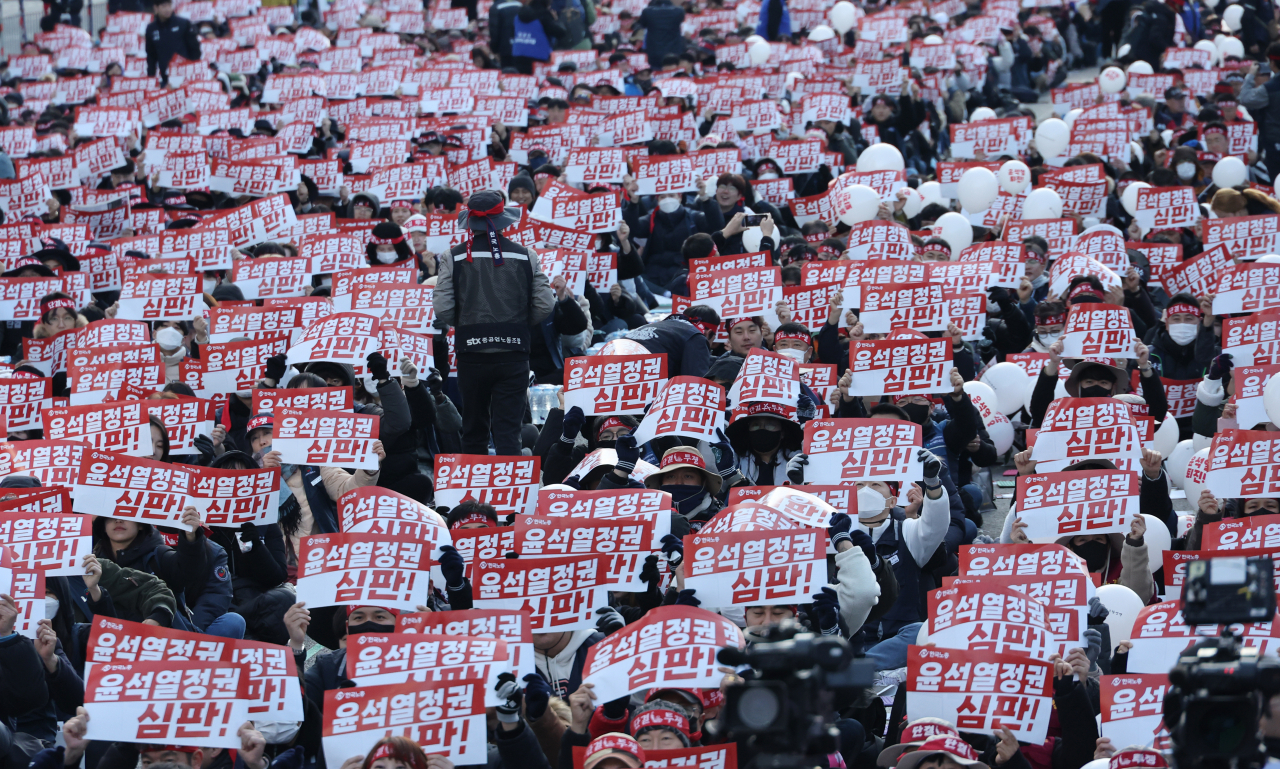
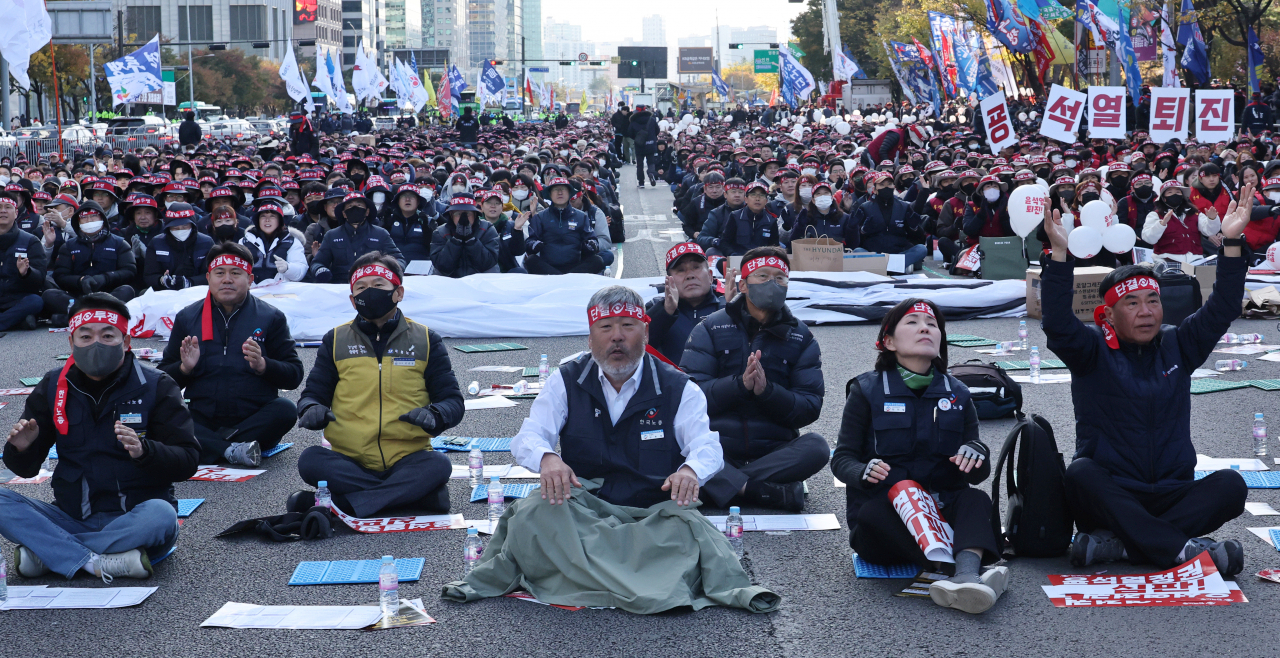
November 11 rally, Seoul,
Korea
(With files from KCNA, Hankyoreh, Xinhua: Photos: Yonhap)
(To access articles individually click on the black headline.)
Website: www.cpcml.ca Email: editor@cpcml.ca


